| Medal Totals | Gold | Silver | Bronze |
|---|---|---|---|
| Canada | 9 | 4 | 3 |
| Czech Republic | 1 | 0 | 1 |
| Czechslovakia | 0 | 4 | 4 |
| Finland | 1 | 2 | 4 |
| Germany | 0 | 1 | 1 |
| Great Britain | 1 | 0 | 1 |
| Russia | 2 | 2 | 1 |
| Slovakia | 0 | 0 | 1 |
| Sweden | 2 | 3 | 4 |
| Switzerland | 0 | 0 | 2 |
| USA | 2 | 8 | 1 |
| USSR | 7 | 1 | 1 |
| West Germany | 0 | 0 | 1 |
Olympic Men's Hockey 1976-2022
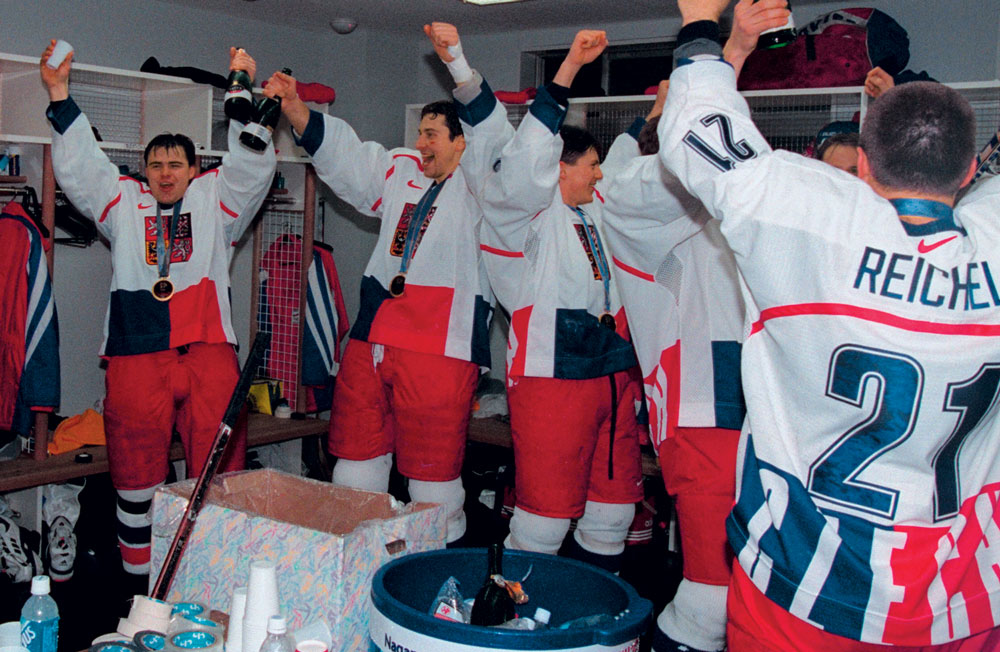
Year-by-Year Medals/Standings by Nation
| 1920 | 1924 | 1928 | 1932 | 1936 | 1948 | 1952 | 1956 | 1960 | 1964 | 1968 | 1972 | |
|---|---|---|---|---|---|---|---|---|---|---|---|---|
| Australia | 9 | |||||||||||
| Austria | NR | 8 | 8 | 10 | NR | |||||||
| Belarus | ||||||||||||
| Belgium | NR | NR | NR | NR | ||||||||
| Bulgaria | ||||||||||||
| Canada | 1 | 1 | 1 | 1 | 2 | 1 | 1 | 3 | 2 | 4 | 3 | |
| Czech Republic | ||||||||||||
| Czechoslovakia | 3 | NR | NR | 4 | 2 | 4 | 5 | 4 | 3 | 2 | 3 | |
| East German Republic | 8 | |||||||||||
| Finland | 7 | 7 | 6 | 5 | 5 | |||||||
| France | NR | NR | NR | NR | ||||||||
| Germany | NR | 3 | 5 | |||||||||
| Great Britain | 3 | 4 | 1 | 6 | ||||||||
| Hungary | NR | 7 | NR | |||||||||
| Italy | NR | 9 | 7 | NR | ||||||||
| Japan | NR | 8 | NR | 9 | ||||||||
| Kazakhstan | ||||||||||||
| Latvia | NR | |||||||||||
| Netherlands | ||||||||||||
| Norway | 9 | NR | NR | 8 | ||||||||
| Poland | NR | 4 | NR | 7 | 6 | 8 | NR | 6 | ||||
| Romania | NR | NR | ||||||||||
| Russia | ||||||||||||
| Slovakia | ||||||||||||
| Slovenia | ||||||||||||
| South Korea | ||||||||||||
| Sweden | 4 | 4 | 2 | 6 | 5 | 3 | 4 | 5 | 2 | 4 | 4 | |
| Switzerland | 5 | NR | 3 | NR | 3 | 5 | 9 | 8 | 10 | |||
| Ukraine | ||||||||||||
| USA | 2 | 2 | 2 | 3 | 4 | 2 | 2 | 1 | 5 | 6 | 2 | |
| USSR | 1 | 3 | 1 | 1 | 1 | |||||||
| West Germany | 8 | 6 | 6 | 7 | 7 | 7 | ||||||
| Yugoslavia | NR | NR | 11 |
| 1976 | 1980 | 1984 | 1988 | 1992 | 1994 | 1998 | 2002 | 2006 | 2010 | 2014 | 2018 | 2022 | |
|---|---|---|---|---|---|---|---|---|---|---|---|---|---|
| Australia | |||||||||||||
| Austria | 8 | NR | 9 | 12 | 14 | 12 | 10 | ||||||
| Belarus | 5 | 4 | 9 | ||||||||||
| Belgium | |||||||||||||
| Bulgaria | 12 | ||||||||||||
| Canada | 6 | 4 | 4 | 2 | 2 | 4 | 1 | 7 | 1 | 1 | 3 | 6 | |
| China | 12 | ||||||||||||
| Czech Republic | 5 | 1 | 7 | 3 | 7 | 6 | 4 | 9 | |||||
| Czechoslovakia | 2 | 5 | 2 | 6 | 3 | ||||||||
| Denmark | 7 | ||||||||||||
| East German Republic | |||||||||||||
| Finland | 4 | 4 | 6 | 2 | 7 | 3 | 3 | 6 | 2 | 3 | 3 | 6 | 1 |
| France | 11 | 8 | 10 | 11 | 14 | ||||||||
| Germany | 6 | 7 | 9 | 8 | 10 | 11 | 2 | 10 | |||||
| Great Britain | NR | ||||||||||||
| Hungary | |||||||||||||
| Italy | NR | 12 | 9 | 12 | 11 | ||||||||
| Japan | 9 | 12 | NR | 13 | |||||||||
| Kazakhstan | 5 | 9 | |||||||||||
| Latvia | NR | 9 | 12 | 12 | 8 | 11 | |||||||
| Netherlands | 8 | ||||||||||||
| Norway | 11 | NR | 12 | 9 | 11 | 10 | 12 | 8 | |||||
| Poland | 6 | 7 | 8 | 10 | 11 | NR | |||||||
| Romania | 7 | 9 | |||||||||||
| Russia | 1 | 4 | 2 | 3 | 4 | 6 | 5 | 1 | 2 | ||||
| Slovakia | 6 | 10 | 13 | 5 | 4 | 11 | 11 | 3 | |||||
| Slovenia | 7 | 9 | |||||||||||
| South Korea | 12 | ||||||||||||
| Sweden | 3 | 3 | 3 | 5 | 1 | 5 | 5 | 1 | 5 | 2 | 5 | 4 | |
| Switzerland | 11 | 8 | 10 | 11 | 6 | 8 | 9 | 10 | 8 | ||||
| Ukraine | 10 | ||||||||||||
| USA | 5 | 1 | 7 | 7 | 4 | 8 | 5 | 2 | 8 | 2 | 4 | 7 | 5 |
| USSR | 1 | 2 | 1 | 1 | |||||||||
| West Germany | 3 | 10 | 5 | 5 | |||||||||
| Yugoslavia | 10 | NR |
Medals Totals
Olympic Games Results 1976-2022
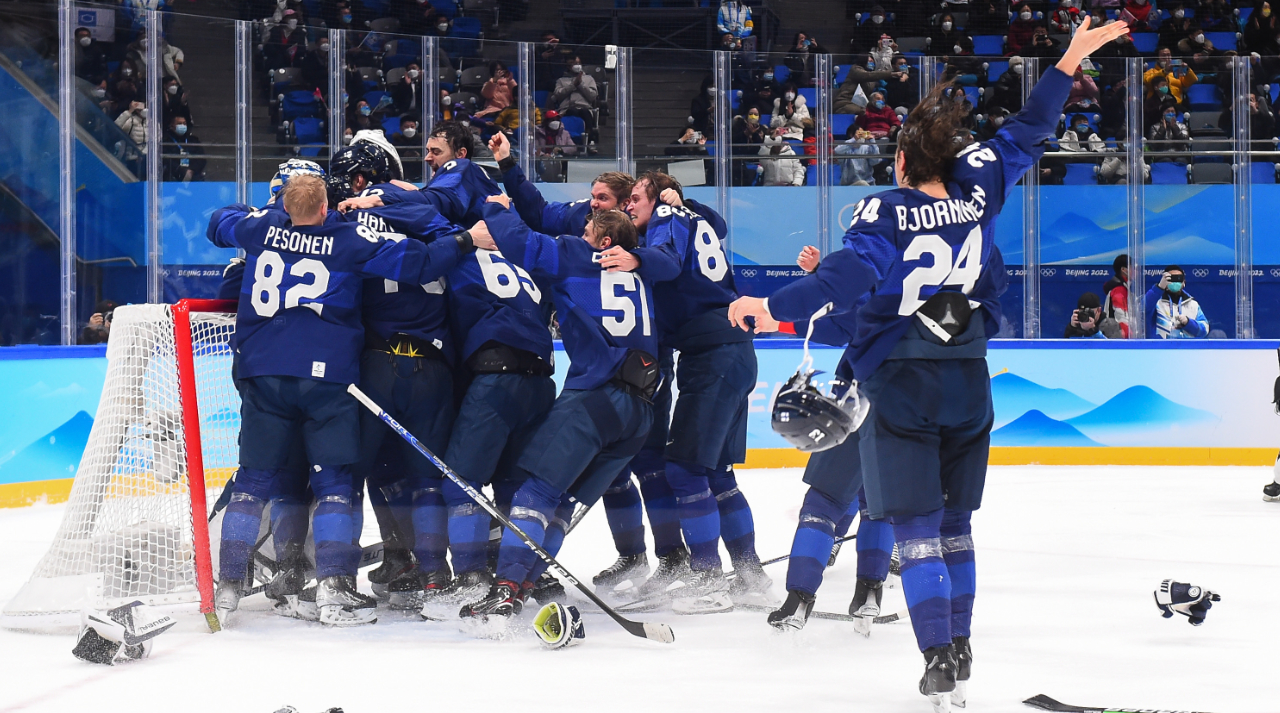

Team Finland
Russian Olympic Committee
Team Slovakia
Prior to the 2021-22 season, the National Hockey League confirmed that NHL players could compete in the 2022 Winter Olympics, but as the year wound down, the NHL announced that its players would not be released as rising COVID-19 cases caused many games to be rescheduled.
The decision substantially altered the complexion of the Winter Olympic hockey tournament. The countries favoured to win because of the number of NHL stars on their roster were no longer shoo-ins. In fact. No one really knew what to expect.
Twelve countries participated in the tournament, and after battling through the qualifying rounds, the quarter-finals and semi-finals, some sizable surprises emerged. In the quarter-finals the United States was eliminated by Slovakia in a shoot-out, while Sweden shut out Canada 2-0. Sweden, another front-runner if they had competed with a roster that included NHLers, was stopped in the semi-final by the Russian Olympic Committee (ROC) team that edged them out 2-1 in a marathon shootout.
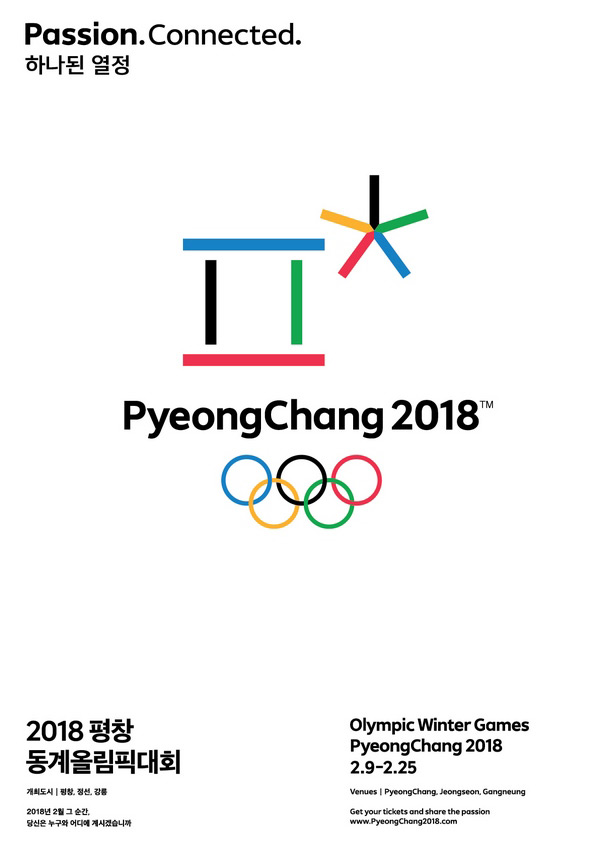
Team Finland
Russian Olympic Committee
Team Slovakia
The medal games were played on consecutive days at the Beijing National Indoor Stadium. In the Bronze Medal contest, played on February 19, 2022, Slovakia shut out Sweden 4-0 to earn their first Olympic medal in hockey since 1998 when NHL players were first permitted to compete in the international tournament.
That left ROC and Finland to play for the Olympic Gold the next day. It was a close match, but tied at one apiece going into the third period, Finland’s Marko Anttila fired a shot at the ROC goal that Hannes Bjorninen redirected past the goaltender. It proved to be the winning goal, and Finland celebrated winning the country’s first-ever Gold Medal in Men’s Olympic Hockey. The Finns had previously won three Bronze Medals since 1998: Nagano in 1998, Vancouver in 2010 and Sochi in 2014.
The media all-star team featured Slovakian goaltender Patrik Rybar, the defenders were Mikko Lehtonen of Finland and Yegar Yakovlev of ROC, and forwards Sakari Mannien of Finland, Lucas Wallmark of Sweden, and Juraj Slafkovsky of Slovakia, who was also named MVP.
| Rank | Country | Games | Wins | Losses | OT Losses | Points |
|---|---|---|---|---|---|---|
| 1 | Finland | 6 | 6 | 0 | 0 | 17 |
| 2 | ROC | 6 | 4 | 1 | 1 | 13 |
| 3 | Slovakia | 7 | 4 | 3 | 0 | 11 |
| 4 | Sweden | 6 | 3 | 1 | 2 | 11 |
| 5 | USA | 4 | 3 | 0 | 1 | 9 |
| 6 | Canada | 5 | 3 | 2 | 0 | 9 |
| 7 | Denmark | 5 | 3 | 2 | 0 | 9 |
| 8 | Switzerland | 5 | 2 | 2 | 1 | 7 |
| 9 | Czechia | 4 | 2 | 2 | 0 | 4 |
| 10 | Germany | 4 | 1 | 3 | 0 | 3 |
| 11 | Latvia | 4 | 0 | 4 | 0 | 0 |
| 12 | China | 4 | 0 | 4 | 0 | 0 |
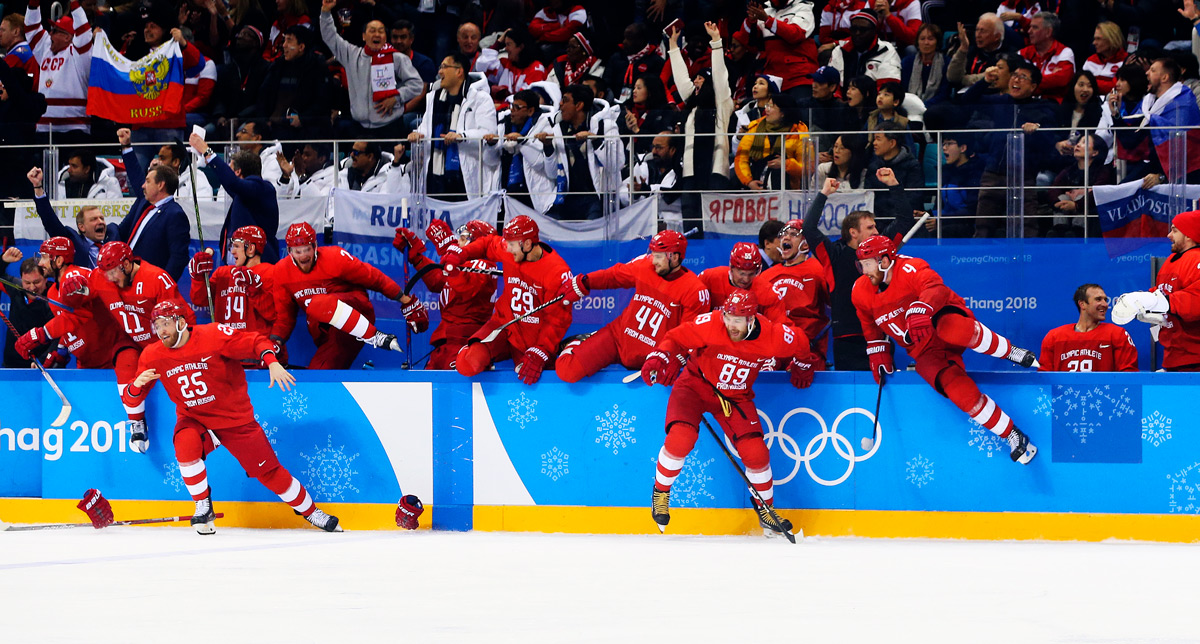

Olympic Athletes from Russia
Team Germany
Team Canada
For the first time since 1994, the Olympic men’s hockey competition would take place without the participation of NHL players. The event was held in PyeongChang, South Korea, with 12 countries vying for gold.
The Russian national team, playing under the name of the Olympic Athletes from Russia (OAR) took on the Czech Republic in the first semi-final game and came away with an impressive 3-0 victory to secure their spot in the gold medal contest.
The second semi-final pitted Canada against the surprising team from Germany. It was the Germans who jumped ahead early and held a 4-1 advantage after two periods. The Canadians battled back in the third, but Germany was able to hang on and win by a score of 4-3.
OAR and Germany battled to a nearly scoreless first period in the gold medal game until Vyacheslav Voynov put OAR on the board with just one second remaining in the frame. Felix Schutz would tie the game for Germany in the second and the teams would head into the third period all square.

Olympic Athletes from Russia
Team Germany
Team Canada
With just 6:39 to play Nikita Gusev put the OAR ahead. The lead was short-lived however as Germany responded with a goal of their own just 10 seconds later and another one moments after to take the lead. With the OAR trailing, it was Gusev once again who found the back of the net, tying the game with just seconds to play to force the game to overtime.
The OAR would go to the power play halfway through the extra session, putting Germany’s back against the wall. After just 29 seconds with the man advantage, it was Kirill Kaprizov who fired home the winning goal, capturing the gold medal for the OAR.
Canada would defeat the Czech Republic for the bronze medal and goaltender Danny aus den Birken of Germany and defender Vyacheslav Voynov and forward Nikita Gusev from the OAR were named the tournament's best players as selected by the directorate.
| Rank | Country | Games | Wins | Losses | OT Losses | Points |
|---|---|---|---|---|---|---|
| 1 | OAR | 6 | 4 | 1 | 1 | 14 |
| 2 | Germany | 7 | 1 | 3 | 2 | 10 |
| 3 | Canada | 6 | 4 | 0 | 2 | 13 |
| 4 | Czech Republic | 6 | 2 | 2 | 2 | 10 |
| 5 | Sweden | 4 | 3 | 0 | 1 | 10 |
| 6 | Finland | 5 | 3 | 1 | 2 | 9 |
| 7 | USA | 5 | 2 | 0 | 3 | 8 |
| 8 | Norway | 5 | 0 | 1 | 4 | 3 |
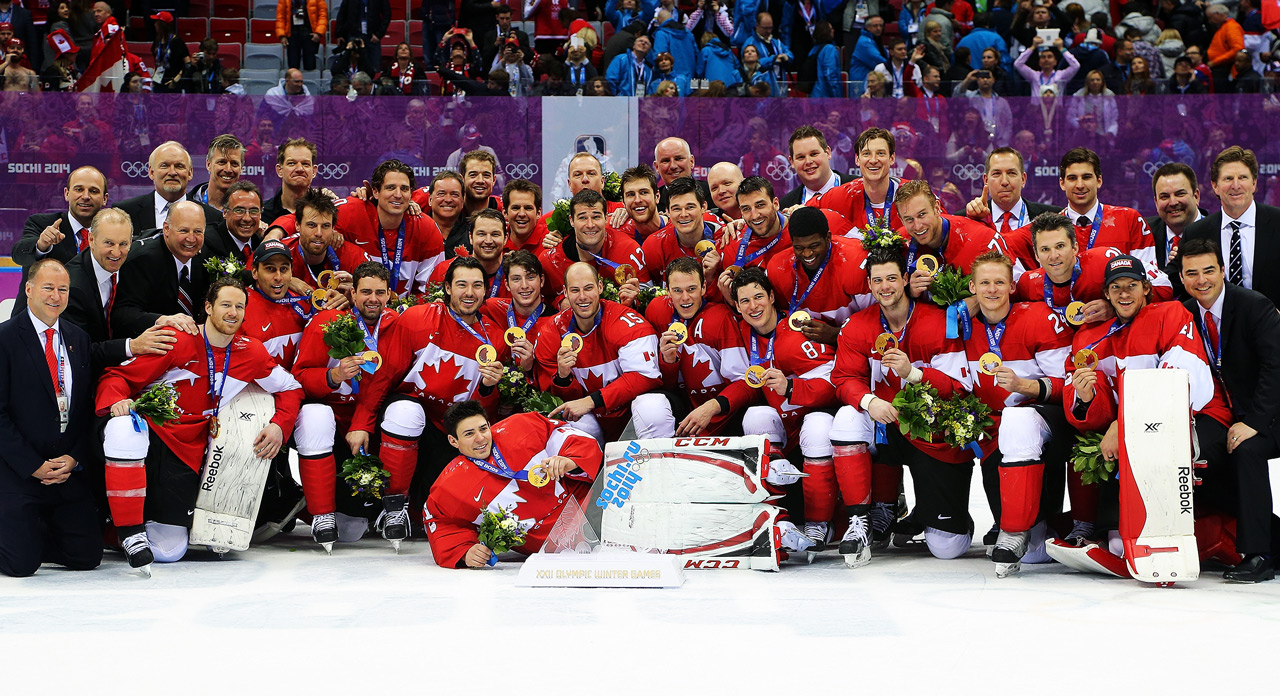
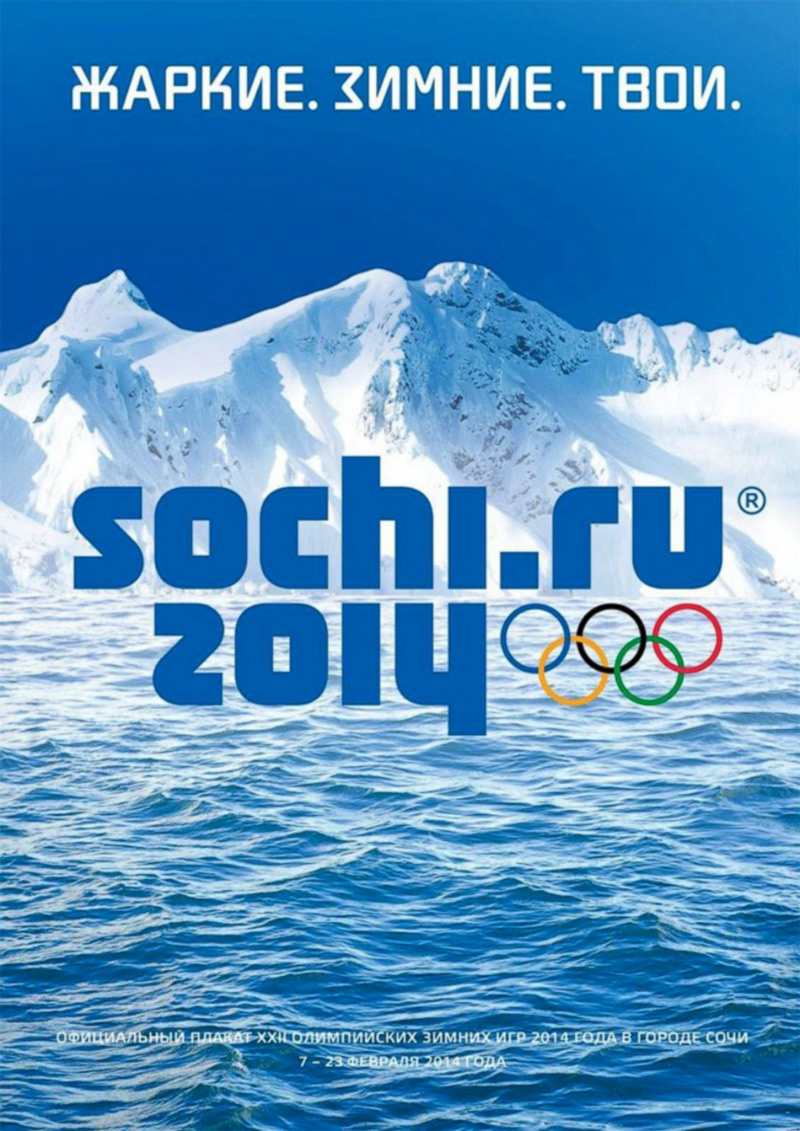
Team Canada
Team Sweden
Team Finland
By virtue of their thrilling overtime win in Vancouver four years earlier, the Canadian team arrived in Russia as the reigning Olympic champions. The Russians, playing on home ice, the offensively powerful Americans, and the always tough Swedish teams were also expected to vie for medals.
Canada began the tournament against Norway and though they got off to a slow start, the end result was a 3-1 Canadian victory. Canada then defeated Austria before taking on Finland in what was expected to be the team's first true test. The Finnish team gave Canada all they could handle, playing a tight-checking, physical game. The teams would exchange goals in regulation time, with Drew Doughty breaking the deadlock in overtime to give Canada the 2-1 victory.
The quarterfinal would see Canada square off against the surprising Latvian team. Led by goaltender Kristers Gudlevskis, who made 55 saves, Latvia gave Canada their biggest scare of the tournament. A late goal by Shea Weber gave Canada the 2-1 victory and the Canadian team and fans drew a collective sigh of relief.
The semifinal game would be a rematch of the 2010 gold medal game, with the United States and Canada once again facing off on the international stage. A first period goal by Jamie Benn proved to be the difference and the only goal of the hockey game as Canada's tenacious checking and defence stifled the American attack.

Team Canada
Team Sweden
Team Finland
Sweden's road to the championship game was completely blemish-free. Despite several key injuries, they went undefeated during the qualification round and overwhelmed Slovenia in quarterfinal play by a score of 5-0. In seminfinal action, Sweden would take on their neighbours and rivals from Finland. With all the scoring coming in the second period, Sweden would emerge victorious by a score of 2-1, buoyed by Erik Karlsson who scored the game-winning goal.
The gold medal game pitted the 2006 Olympic champion, Sweden, against Canada, the 2002 and 2010 winner. Like he had done in the gold medal game four years earlier, Jonathan Toews opened the scoring to give Canada a 1-0 lead. 2010 hero, Sidney Crosby, would be next to find the back of the net for Canada. His breakaway goal gave Canada a seemingly insurmountable two goal lead and when Chris Kunitz made the score 3-0, the countdown was on. As the final seconds ticked off the clock, Canada had repeated as Olympic champions.
Individual awards as selected by the tournament directorate went to Canada's Carey Price as Best Goalkeeper, Sweden's Erik Karlsson as Best Defenceman and the USA's Phil Kessel as best forward. The legendary Teemu Selanne was voted tournament MVP by the media.
| Rank | Country | Games | Wins | Losses | OT Losses | Points |
|---|---|---|---|---|---|---|
| 1 | Canada | 6 | 6 | 0 | 0 | 17 |
| 2 | Sweden | 6 | 5 | 1 | 0 | 15 |
| 3 | Finland | 6 | 4 | 3 | 0 | 13 |
| 4 | USA | 6 | 3 | 3 | 0 | 11 |
| 5 | Russia | 5 | 3 | 2 | 0 | 9 |
| 6 | Czech Republic | 5 | 2 | 3 | 0 | 6 |
| 7 | Slovenia | 5 | 2 | 3 | 0 | 6 |
| 8 | Latvia | 5 | 1 | 4 | 0 | 3 |
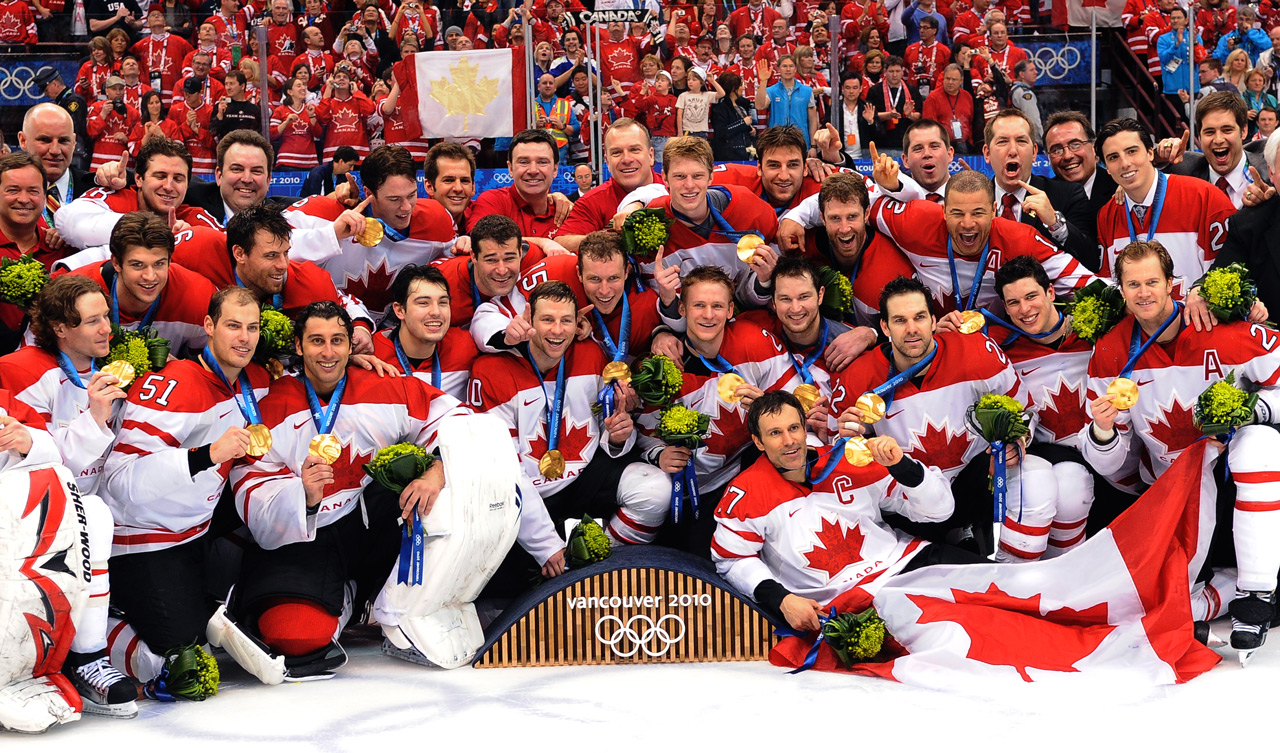
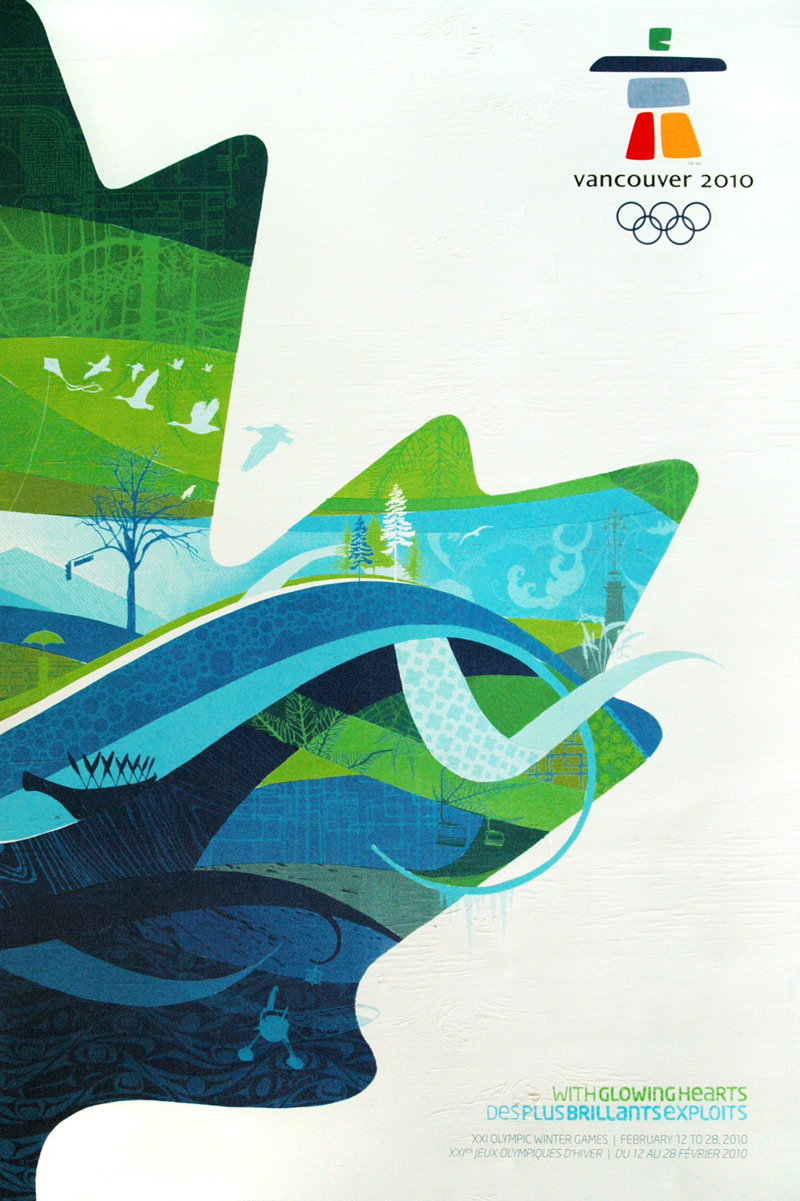
Team Canada
Team USA
Team Finland
No one could have written a more compelling script for a North American showdown between Canada and the US.
Canada entered the Games as co-favourite with Russia while the young American team was ranked sixth by the International Ice Hockey Federation. But the US squad's speed, tenacity and unrivalled goaltending landed them the top rank after the preliminary round. Led by netminder Ryan Miller and savvy veteran rearguard Brian Rafalski, the Americans never trailed in a game leading up to the gold-medal final. This included a shutout win over Switzerland in the quarterfinals and a six-goal, first-period domination over the Finnish team in the semis, resulting in a 6-1 victory.
Canada meanwhile struggled through the round robin requiring a shootout to defeat Switzerland and losing to the Americans 5-3. Following that defeat, Canada decided to replace legendary goaltender Martin Brodeur, who led them to gold in 2002, with local favourite Roberto Luongo in net. After a victory against Germany, Canada was matched in the quarterfinals against Russia, who boasted an incredible forward quartet of Alex Ovechkin, Evgeni Malkin, Ilya Kovalchuk and Pavel Datsyuk. Unlike in 2006 when the Russians kept Canada off the score sheet and eliminated them in the quarterfinals, the Canadians exploded with four goals in the first period en route to a 7-3 final. In their semifinal game, Canada faced an impressive Slovakian club that had earlier beaten the Russians and eliminated Sweden, the defending Olympic champions. Canada took a commanding 3-0 lead into the third period, but the Slovaks showed incredible resolve and scored twice in the third period and dominated the last minute, only to be robbed by an unbelievable glove hand stop by Luongo with seconds remaining.
The gold-medal final was a revisit to 2002. The Americans were looking to avenge their loss on home ice eight years earlier while Canada were thankful to get another shot at their rivals who had humbled them exactly a week earlier.

Team Canada
Team USA
Team Finland
It was Canadian centre Jonathan Toews who opened the scoring halfway through the first period. Corey Perry extended Canada's lead to two in the second before US forward Ryan Kessler deflected a shot past Luongo to make it a one-goal game. With the goalie pulled for a sixth attacker late in the third period, the resilient Americans peppered the Canadian net with shots until Zach Parise slid home the tying goal with just 25 seconds remaining in regulation, forcing overtime.
Overtime would be 20 minutes of four-on-four hockey with a shootout to follow if needed. Rather than playing it safe after the emotional goal against, the Canadian coaching staff elected to press for the win. After continuous pressure on the Americans, it was superstar Sidney Crosby that scored the gold-winning goal at the 7:40 mark of overtime.
After the game, Miller was named the tournament's top player. The all-star team consisted of Miller in net, Rafalski and Canada's Shea Weber on defense, and forwards Toews, Parise and Slovak Pavol Demitra who led all scorers with 10 points.
The biggest surprise on Canada was the play of their two youngest players, 21 year-old Jonathan Toews and defenseman Drew Doughty who turned 20 just two months prior to the Games. Toews led Canada in nearly every category including assists (7), points (8), plus/minus (+9) and faceoff percentage (64.76). Doughty meanwhile started the tournament as the team's seventh defenseman but soon worked his way into regular rotation and was on the ice for the gold-medal goal.
| Rank | Country | Games | Wins | Losses | OT Losses | Points |
|---|---|---|---|---|---|---|
| 1 | Canada | 7 | 6 | 1 | 0 | 12 |
| 2 | USA | 6 | 5 | 1 | 0 | 10 |
| 3 | Finland | 6 | 4 | 2 | 0 | 8 |
| 4 | Slovakia | 7 | 4 | 3 | 0 | 8 |
| 5 | Sweden | 4 | 3 | 1 | 0 | 6 |
| 6 | Russia | 4 | 2 | 2 | 0 | 4 |
| 7 | Czech Republic | 5 | 3 | 2 | 0 | 6 |
| 8 | Switzerland | 5 | 1 | 4 | 0 | 2 |
| 9 | Belarus | 4 | 1 | 3 | 0 | 2 |
| 10 | Norway | 4 | 0 | 4 | 0 | 0 |
| 11 | Germany | 4 | 0 | 4 | 0 | 0 |
| 12 | Latvia | 4 | 0 | 4 | 0 | 0 |
Chronology
Preliminary Round (Group A)
| USA | 3 | Switzerland | 1 |
| Canada | 8 | Norway | 0 |
| USA | 6 | Norway | 1 |
| Switzerland | 2 | Canada | 3 |
| Norway | 4 | Switzerland | 5 |
| Canada | 3 | USA | 5 |
Preliminary Round (Group B)
| Russia | 8 | Latvia | 2 |
| Czech Republic | 3 | Slovakia | 1 |
| Slovakia | 2 | Russia | 1 |
| Czech Republic | 5 | Latvia | 2 |
| Finland | 5 | Germany | 0 |
| Latvia | 0 | Slovakia | 6 |
| Russia | 4 | Czech Republic | 2 |
Preliminary Round (Group C)
| Finland | 5 | Belarus | 1 |
| Sweden | 2 | Germany | 0 |
| Belarus | 2 | Sweden | 4 |
| Germany | 3 | Belarus | 5 |
| Sweden | 3 | Finland | 0 |
Qualification Round
| Switzerland | 3 | Belarus | 2 |
| Canada | 8 | Germany | 2 |
| Czech Republic | 3 | Latvia | 2 |
| Slovakia | 4 | Norway | 3 |
Quarterfinals
| USA | 2 | Switzerland | 0 |
| Russia | 3 | Canada | 7 |
| Finland | 2 | Czech Republic | 0 |
| Sweden | 3 | Slovakia | 4 |
Semifinals
| USA | 6 | Finland | 1 |
| Canada | 3 | Slovakia | 2 |
Bronze Medal Game
| Finland | 5 | Slovakia | 3 |
Gold Medal Game
| USA | 2 | Canada | 3 |
Statistical Leaders
Top 15 Total Point Leaders
| Player | Country | No. | GP | G | A | P | PIM |
|---|---|---|---|---|---|---|---|
| DEMITRA, Pavol | Slovakia | 38 | 7 | 3 | 7 | 10 | 2 |
| HOSSA, Marian | Slovakia | 81 | 7 | 3 | 6 | 9 | 6 |
| PARISE, Zach | USA | 9 | 6 | 4 | 4 | 8 | 0 |
| RAFALSKI, Brian | USA | 28 | 6 | 4 | 4 | 8 | 2 |
| TOEWS, Jonathan | Canada | 16 | 7 | 1 | 7 | 8 | 2 |
| IGINLA, Jarome | Canada | 12 | 7 | 5 | 2 | 7 | 0 |
| CROSBY, Sidney | Canada | 87 | 7 | 4 | 3 | 7 | 4 |
| HEATLEY, Dany | Canada | 15 | 7 | 4 | 3 | 7 | 4 |
| GETZLAF, Ryan | Canada | 51 | 7 | 3 | 7 | 7 | 2 |
| HAGMAN, Niklas | Finland | 10 | 6 | 4 | 2 | 6 | 2 |
| MALKIN, Evgeni | Russia | 11 | 4 | 3 | 3 | 6 | 0 |
| HANDZUS, Michal | Slovakia | 26 | 7 | 3 | 3 | 6 | 0 |
| WEBER, Shea | Canada | 6 | 7 | 2 | 4 | 6 | 2 |
| ZEDNIK, Richard | Slovakia | 20 | 7 | 2 | 4 | 6 | 6 |
| BACKSTROM, Nicklas | Sweden | 19 | 4 | 1 | 5 | 6 | 0 |
Top 5 Goal Scorers
| Player | Country | No. | GP | G |
|---|---|---|---|---|
| IGINLA, Jarome | Canada | 12 | 7 | 5 |
| VIKINGSTAD, Tore | Norway | 29 | 4 | 4 |
| HAGMAN, Niklas | Finland | 10 | 6 | 4 |
| PARISE, Zach | USA | 9 | 6 | 4 |
| RAFALSKI, Brian | USA | 28 | 6 | 4 |
Top 5 Assist Leaders
| Player | Country | No. | GP | A |
|---|---|---|---|---|
| DEMITRA, Pavol | Slovakia | 38 | 7 | 7 |
| TOEWS, Jonathan | Canada | 16 | 7 | 7 |
| HOSSA, Marian | Slovakia | 81 | 7 | 6 |
| KEITH, Duncan | Canada | 2 | 7 | 6 |
| BACKSTROM, Nicklas | Sweden | 19 | 4 | 5 |
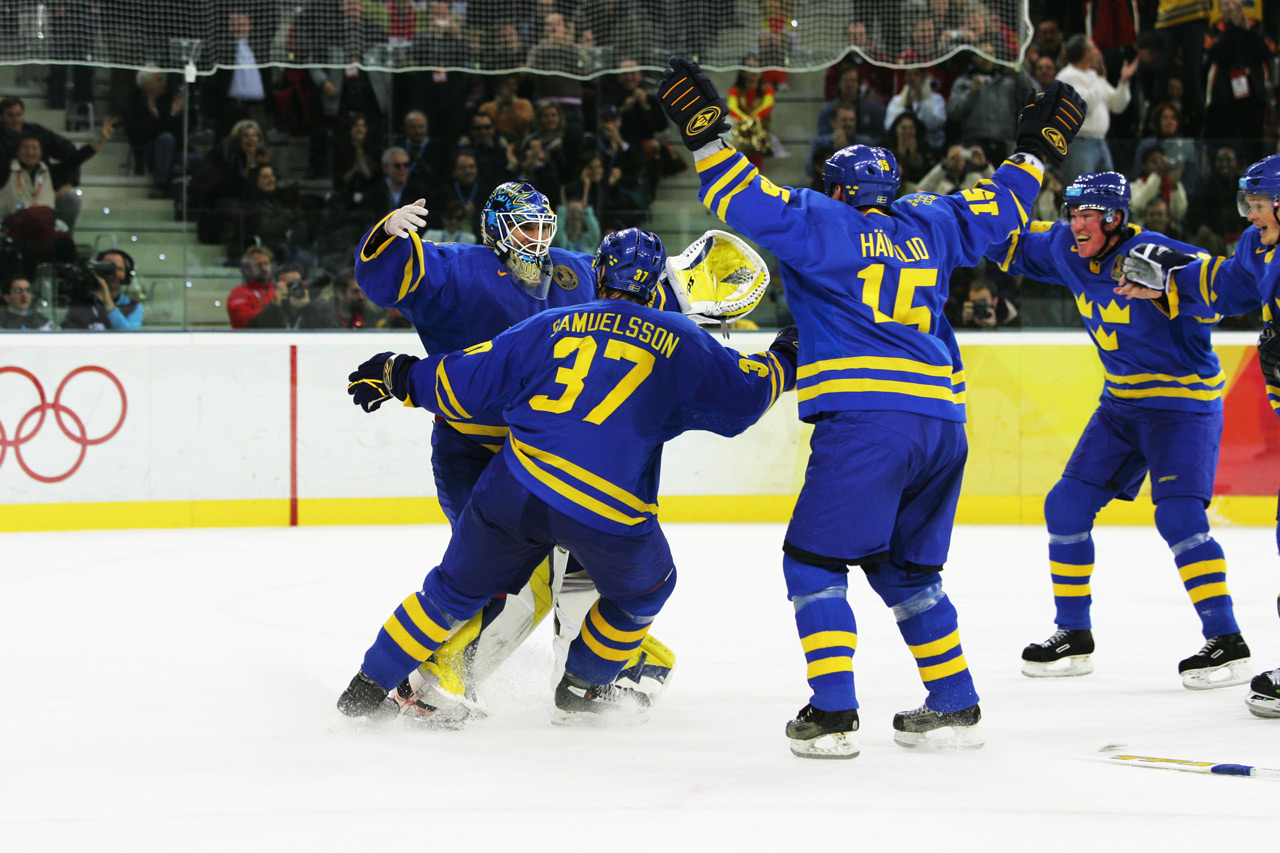
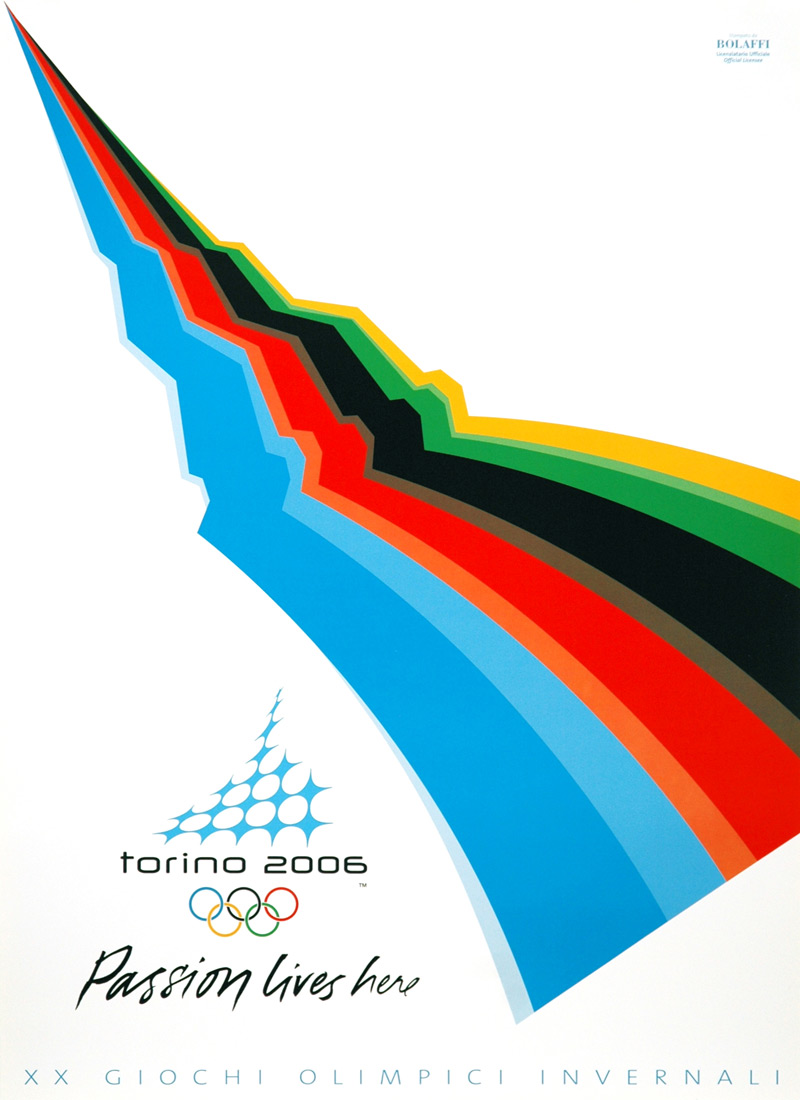
Team Sweden
Team Finland
Team Czech Republic
Turin was the setting as ice hockey showcased its elite athletes once again after hard negotiating between the various parties - the IIHF, the NHL and the NHLPA. The simplified tournament structure had two groups of six games playing a round-robin format within the group. The top four teams from each group would advance to the Playoff Round. The only major surprise from this portion of games came when Switzerland defeated Canada 2 - 0 and wound up ahead of Canada in second place in Group A.
As always, the quarter-finals proved to be nerve-wracking for the fans as well as the teams. A loss in this part of the tournament sends you home, whereas a winning team is guaranteed two more games and a chance at an Olympic medal. Switzerland drew the Swedes as competitors, couldn't drum up any more Swiss upsets. The Czechs continued its hockey supremacy over its rival Slovakia while Finland eliminated Team USA. Defending Olympic champion Team Canada never really were able to raise its game to the level required lost to Russia, ending hopes for back to back Olympic honour. If it wasn't clear before the playoffs, it certainly was by the time the semi-final games took place, Finland and Sweden were the class of the event. The Finns easily disposed of Russia and in the process, earned their fifth shutout through seven games. Earlier in the day, the Swedes pounded the Czechs - scoring seven goals to set up the classic Nordic final for gold.

Team Sweden
Team Finland
Team Czech Republic
Sweden was seeking its second ever Olympic gold medal and was led by the man who clinched its first - Peter Forsberg with that memorable shoot-out goal in 1994 over Canada. Finland countered with legend Teemu Selanne, who was a dominant player during the entire event. His will to win was evident in his demeanour as well as on the score sheet. Going into the final, many predicted the margin between winning and losing would be small. As the third period began, the two teams were deadlocked at two, but the decisive goal came early and emphatically. Forsberg and Mats Sundin controlled the opening face-off, attacking the Finnish zone, ultimately dropping a pass back to Nicklas Lidstrom who scored the gold-medal worthy goal to claim the title.
Swedish rearguard Kenny Jonsson was selected as the Best Defenseman by the IIHF Directorate. There was bitter disappoint in the other dressing room, as Finland failed in its bid to win its first Olympic gold medal. Selanne did however, claimed Best Forward honours and goaltender Antero Niittymaki was certainly the deserving recipient of the Best Goalkeeper Award. He also was named the MVP of the tournament.
| Rank | Country | Games | Wins | Losses | OT Losses | Points |
|---|---|---|---|---|---|---|
| 1 | Sweden | 8 | 6 | 2 | 0 | 12 |
| 2 | Finland | 8 | 7 | 1 | 0 | 14 |
| 3 | Czech Republic | 8 | 4 | 4 | 0 | 8 |
| 4 | Russia | 8 | 5 | 3 | 0 | 10 |
| 5 | Slovakia | 6 | 5 | 1 | 0 | 10 |
| 6 | Switzerland | 6 | 2 | 2 | 2 | 6 |
| 7 | Canada | 6 | 3 | 3 | 0 | 6 |
| 8 | USA | 6 | 1 | 4 | 1 | 3 |
| 9 | Kazakhstan | 5 | 1 | 4 | 0 | 2 |
| 10 | Germany | 5 | 0 | 3 | 2 | 2 |
| 11 | Italy | 5 | 0 | 3 | 2 | 2 |
| 12 | Latvia | 5 | 0 | 4 | 1 | 1 |
Chronology
Preliminary Round (Group A)
| Italy | 2 | Canada | 7 |
| Switzerland | 0 | Finland | 5 |
| Germany | 1 | Czech Republic | 4 |
| Finland | 6 | Italy | 0 |
| Czech Republic | 2 | Switzerland | 3 |
| Canada | 5 | Germany | 1 |
| Italy | 3 | Germany | 3 |
| Canada | 0 | Switzerland | 2 |
| Czech Republic | 2 | Finland | 4 |
| Germany | 2 | Switzerland | 2 |
| Czech Republic | 4 | Italy | 1 |
| Finland | 2 | Canada | 0 |
| Switzerland | 3 | Italy | 3 |
| Finland | 2 | Germany | 0 |
| Canada | 3 | Czech Republic | 2 |
Preliminary Round (Group B)
| Kazakhstan | 2 | Sweden | 7 |
| Russia | 3 | Slovakia | 5 |
| Latvia | 3 | USA | 3 |
| Sweden | 0 | Russia | 5 |
| Slovakia | 6 | Latvia | 3 |
| USA | 4 | Kazakhstan | 1 |
| Kazakhstan | 0 | Russia | 1 |
| Sweden | 6 | Latvia | 1 |
| Slovakia | 2 | USA | 1 |
| Russia | 9 | Latvia | 2 |
| Slovakia | 2 | Kazakhstan | 1 |
| USA | 1 | Sweden | 2 |
| Latvia | 2 | Kazakhstan | 5 |
| Sweden | 0 | Slovakia | 3 |
| USA | 4 | Russia | 5 |
Quarterfinals
| Switzerland | 2 | Sweden | 6 |
| Finland | 4 | USA | 3 |
| Russia | 2 | Canada | 0 |
| Slovakia | 1 | Czech Republic | 3 |
Semifinals
| Sweden | 7 | Czech Republic | 3 |
| Finland | 4 | Russia | 0 |
Bronze Medal Game
| Russia | 0 | Czech Republic | 3 |
Gold Medal Game
| Finland | 2 | Sweden | 3 |
Statistical Leaders
Top 15 Total Point Leaders
| Player | Country | No. | GP | G | A | P | PIM |
|---|---|---|---|---|---|---|---|
| SELANNE, Teemu | Finland | 8 | 8 | 6 | 5 | 11 | 4 |
| KOIVU, Saku | Finland | 11 | 8 | 3 | 8 | 11 | 12 |
| ALFREDSSON, Daniel | Sweden | 11 | 8 | 5 | 5 | 10 | 4 |
| HOSSA, Marian | Slovakia | 81 | 6 | 5 | 5 | 10 | 4 |
| PELTONEN, Ville | Finland | 16 | 8 | 4 | 5 | 9 | 6 |
| JOKINEN, Olli | Finland | 12 | 8 | 6 | 2 | 8 | 2 |
| LEHTINEN, Jere | Finland | 26 | 8 | 3 | 5 | 8 | 0 |
| SUNDIN, Mats | Sweden | 13 | 8 | 3 | 5 | 8 | 4 |
| STRAKA, Martin | Czech Republic | 28 | 8 | 2 | 6 | 8 | 6 |
| DATSYUK, Pavel | Russia | 13 | 8 | 1 | 7 | 8 | 10 |
| KORESHKOV, Yevgeny | Kazakhstan | 19 | 5 | 5 | 2 | 7 | 6 |
| GABORIK, Marian | Slovakia | 10 | 6 | 3 | 4 | 7 | 4 |
| JAGR, Jaromir | Czech Republic | 68 | 8 | 2 | 5 | 7 | 6 |
| DEMITRA, Pavol | Slovakia | 38 | 6 | 2 | 5 | 7 | 2 |
| KOVALEV, Alexei | Russia | 27 | 8 | 4 | 2 | 6 | 4 |
Top 5 Goal Scorers
| Player | Country | No. | GP | G |
|---|---|---|---|---|
| JOKINEN, Olli | Finland | 12 | 8 | 6 |
| SELANNE, Teemu | Finland | 8 | 8 | 6 |
| OVECHKIN, Alexander | Russia | 8 | 8 | 5 |
| ALFREDSSON, Daniel | Sweden | 11 | 8 | 5 |
| HOSSA, Marian | Slovakia | 81 | 6 | 5 |
Top 5 Assist Leaders
| Player | Country | No. | GP | A |
|---|---|---|---|---|
| KOIVU, Saku | Finland | 11 | 8 | 8 |
| DATSYUK, Pavel | Russia | 13 | 8 | 7 |
| STRAKA, Martin | Czech Republic | 28 | 8 | 6 |
| FORSBERG, Peter | Sweden | 21 | 6 | 6 |
| ALFREDSSON, Daniel | Sweden | 11 | 8 | 5 |
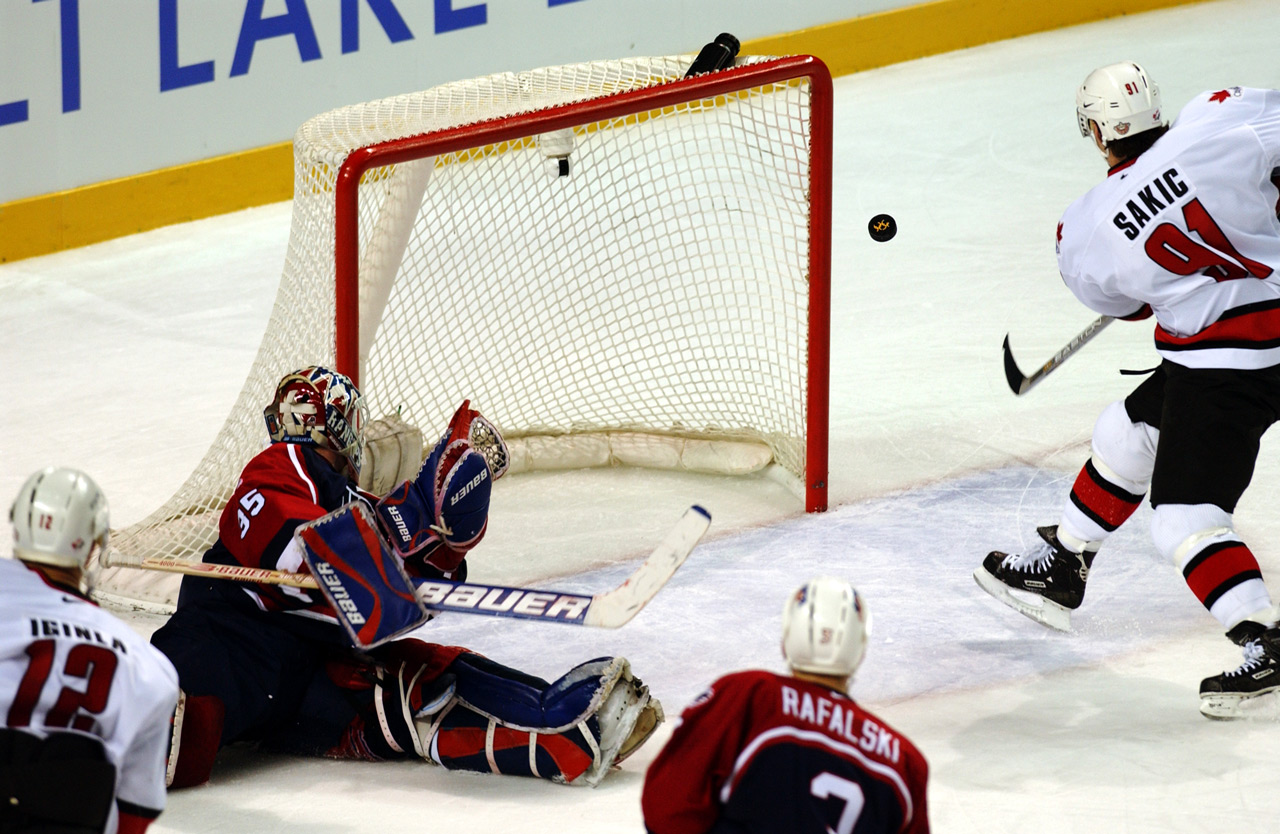
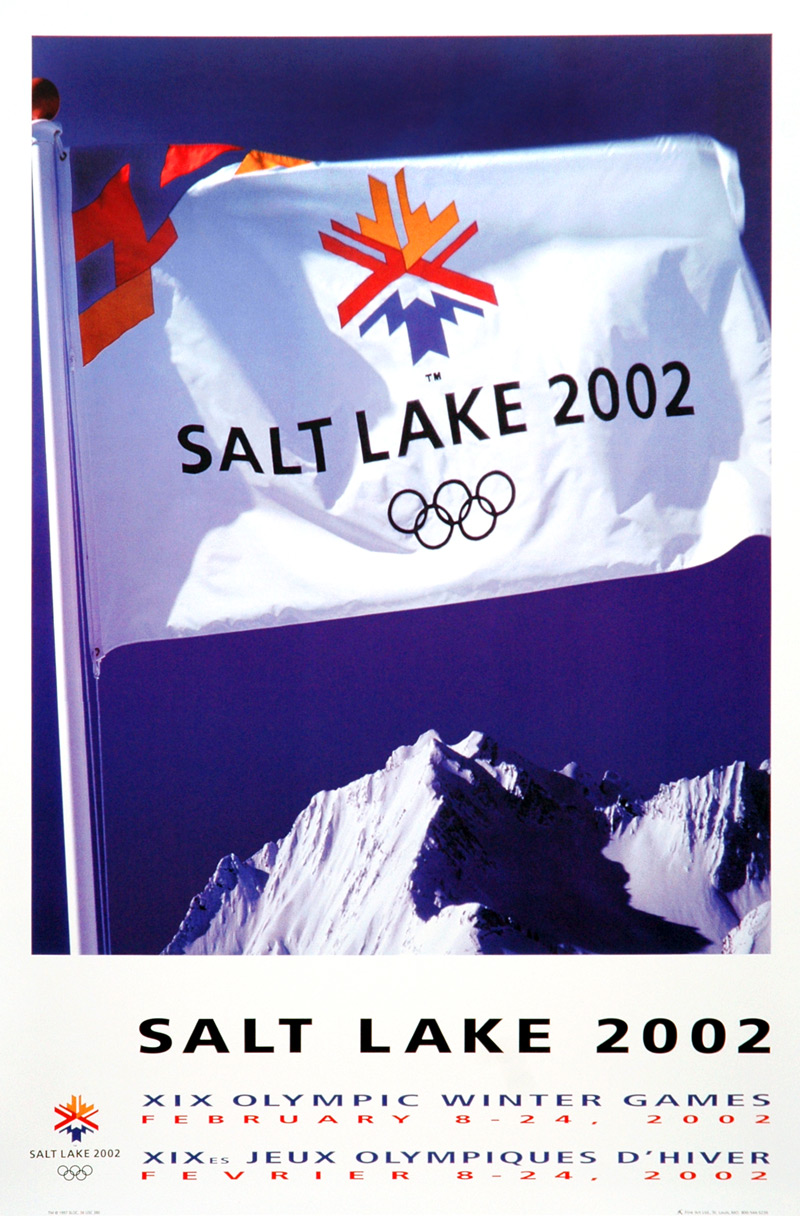
Team Canada
Team USA
Team Russia
NHL players returned for an Olympic ice hockey encore after its Nagano experience four years ago. This much anticipated event was thrilling for viewers as they were treated to highly skilled and competitive action.
The Preliminary Round consisted of two groups of four competing in a round robin format, with the top team from each group advancing to the Final Round. Slovakia, a team favoured by many to move on to the next stage, wanted to utilize their top players but were hard pressed to form lineups since the NHL would shut down only after this initial round. In the end, Belarus qualified for the main event as they did back in Nagano and Germany surprised many by also advancing to face-off against the "Big Six".
Fast paced entertaining games were the norm during the Final Round, again consisting of two groups of four that essentially determined the match-ups for the QuarterFinals. Team Canada struggled out of the gate, bowing 5 - 2 to Sweden and then held on for an unimpressive 3 - 2 victory over Germany. The Swedes and the Americans showed good form en route to top spot in their respective groups, and a seemingly easier playoff opponent in Belarus and Germany. USA disposed of the Germans, but the major upset of the tournament came when Belarus eliminated Sweden with a shocking 4 - 3 victory. Defending Olympic champions Czech Republic lined up against Russia, meaning one of these powerhouses would be sent home. This classic battle ended with Russia squeaking out a 1 - 0 win, and later Canada joined the final four after defeating Finland.

Team Canada
Team USA
Team Russia
In the first semi final, Canada dominated Belarus from start to finish, winning 7 - 1 to earn a spot in the gold medal game. The final turned out to be an all North American affair, as the USA held on to beat Russia 3 - 2 in the other semi final. Both teams were obviously familiar with each other and in this one game winner-take-all match, Team Canada aware of the expectations back home prevailed. Canada improved their play as the tournament went on, thus ending a fifty-year drought between gold medals for the hockey nation. USA settled for silver, after collecting gold in both 1980 and 1960. In fact it was their first Olympic loss on American soil since 1932. Russia claimed the bronze the day before, cruising by Belarus 7 - 2.
Team play was definitely the theme but great individual performances still emerged. Mats Sundin led all scorers with nine points in just four games, while Russia's Nikolai Khabibulin was a standout in goal. Canadian captain Mario Lemieux despite injuries, was an inspiration to the team with his gritty performances and Joe Sakic led Canada with seven points including game-winning goal in the final. Directorate Awards went to Khabibulin, (Best Goaltender), USA's Chris Chelios, (Best Defenseman) and Sakic who took home the Best Forward honours.
| Rank | Country | Games | Wins | Losses | OT Losses | Points |
|---|---|---|---|---|---|---|
| 1 | Canada | 6 | 4 | 1 | 1 | 9 |
| 2 | USA | 6 | 4 | 1 | 1 | 9 |
| 3 | Russia | 6 | 3 | 2 | 1 | 7 |
| 4 | Belarus | 9 | 3 | 6 | 0 | 6 |
| 5 | Sweden | 4 | 3 | 1 | 0 | 6 |
| 6 | Finland | 4 | 2 | 2 | 0 | 4 |
| 7 | Czech Republic | 4 | 1 | 2 | 1 | 3 |
| 8 | Germany | 7 | 3 | 4 | 0 | 6 |
| 9 | Latvia | 4 | 2 | 1 | 1 | 5 |
| 10 | Ukraine | 4 | 2 | 2 | 0 | 4 |
| 11 | Switzerland | 4 | 2 | 1 | 1 | 5 |
| 12 | Austria | 4 | 1 | 3 | 0 | 2 |
| 13 | Slovakia | 4 | 1 | 2 | 1 | 3 |
| 14 | France | 4 | 0 | 3 | 1 | 1 |
Chronology
| Description | Team | Score | Team | Score |
|---|---|---|---|---|
| Preliminary Round - Group B | Belarus | 1 | Ukraine | 0 |
| Preliminary Round - Group A | Slovakia | 0 | Germany | 3 |
| Preliminary Round - Group A | Austria | 2 | Latvia | 4 |
| Preliminary Round - Group B | Switzerland | 3 | France | 3 |
| Preliminary Round - Group A | Austria | 2 | Germany | 3 |
| Preliminary Round - Group A | Latvia | 6 | Slovakia | 6 |
| Preliminary Round - Group B | Ukraine | 5 | Switzerland | 2 |
| Preliminary Round - Group B | Belarus | 3 | France | 1 |
| Preliminary Round - Group A | Slovakia | 2 | Austria | 3 |
| Preliminary Round - Group A | Germany | 4 | Latvia | 1 |
| Preliminary Round - Group B | Switzerland | 2 | Belarus | 1 |
| Preliminary Round - Group B | France | 2 | Ukraine | 4 |
| 11th to 12th place | Switzerland | 4 | Austria | 1 |
| 9th to 10th place | Ukraine | 2 | Latvia | 9 |
| 13th to 14th place | Slovakia | 7 | France | 1 |
| Description | Team | Score | Team | Score |
|---|---|---|---|---|
| Final Round - Group D | Russia | 6 | Belarus | 4 |
| Final Round - Group C | Canada | 2 | Sweden | 5 |
| Final Round - Group C | Czech Republic | 8 | Germany | 2 |
| Final Round - Group D | Finland | 0 | USA | 6 |
| Final Round - Group D | Finland | 8 | Belarus | 1 |
| Final Round - Group D | USA | 2 | Russia | 2 |
| Final Round - Group C | Sweden | 2 | Czech Republic | 1 |
| Final Round - Group C | Canada | 3 | Germany | 2 |
| Final Round - Group D | Belarus | 1 | USA | 8 |
| Final Round - Group D | Russia | 1 | Finland | 3 |
| Final Round - Group C | Czech Republic | 3 | Canada | 3 |
| Final Round - Group C | Germany | 1 | Sweden | 7 |
| Quarter Final | Sweden | 3 | Belarus | 4 |
| Quarter Final | Czech Republic | 0 | Russia | 1 |
| Quarter Final | USA | 5 | Germany | 0 |
| Quarter Final | Finland | 1 | Canada | 2 |
| Semi Final | Canada | 7 | Belarus | 1 |
| Semi Final | Russia | 2 | USA | 3 |
| Bronze Medal Game | Belarus | 2 | Russia | 7 |
| Gold Medal Game | USA | 2 | Canada | 5 |
Statistical Leaders
Top 15 Total Point Leaders
| Player | Country | No. | GP | G | A | P | PIM |
|---|---|---|---|---|---|---|---|
| SUNDIN, Mats | Sweden | 13 | 4 | 5 | 4 | 9 | 10 |
| HULL, Brett | USA | 16 | 6 | 3 | 5 | 8 | 6 |
| LECLAIR, John | USA | 10 | 6 | 6 | 1 | 7 | 2 |
| SAKIC, Joe | Canada | 91 | 6 | 4 | 3 | 7 | 0 |
| HOSSA, Marian | Slovakia | 81 | 2 | 4 | 2 | 6 | 0 |
| SOCCIO, Leonard | Germany | 48 | 7 | 3 | 3 | 6 | 8 |
| BOZON, Philippe | France | 12 | 4 | 3 | 3 | 6 | 2 |
| YZERMAN, Steve | Canada | 19 | 6 | 2 | 4 | 6 | 2 |
| LEMIEUX, Mario | Canada | 66 | 5 | 2 | 4 | 6 | 0 |
| LIDSTROM, Nicklas | Sweden | 5 | 4 | 1 | 5 | 6 | 0 |
| MODANO, Mike | USA | 9 | 6 | 0 | 6 | 6 | 4 |
| ROZENTHAL, Maurice | France | 9 | 4 | 4 | 1 | 5 | 2 |
| KATHAN, Klaus | Germany | 49 | 7 | 3 | 2 | 5 | 0 |
| JAGR, Jaromir | Czech Republic | 68 | 4 | 2 | 3 | 5 | 4 |
| NIZIVIJS, Aleksandrs | Latvia | 17 | 4 | 2 | 3 | 5 | 2 |
Top 5 Goal Scorers
| Player | Country | No. | GP | G |
|---|---|---|---|---|
| LECLAIR, John | USA | 10 | 6 | 6 |
| SUNDIN, Mats | Sweden | 13 | 4 | 5 |
| GUERIN, Bill | USA | 13 | 6 | 4 |
| SAKIC, Joe | Canada | 91 | 6 | 4 |
| YOUNG, Scott | USA | 48 | 6 | 4 |
Top 5 Assist Leaders
| Player | Country | No. | GP | A |
|---|---|---|---|---|
| MODANO, Mike | USA | 9 | 6 | 6 |
| HULL, Brett | USA | 16 | 6 | 5 |
| LEETCH, Brian | USA | 2 | 6 | 5 |
| LIDSTROM, Nicklas | Sweden | 5 | 4 | 5 |
| HOUSLEY, Phil | USA | 6 | 6 | 4 |
Top 10 Leading Goaltenders
| Player | Country | No. | GPT | GKD | GPI | MIP | MIP% | GA | SVS | SOG | SVS% | GAA | SO | W | T | L |
|---|---|---|---|---|---|---|---|---|---|---|---|---|---|---|---|---|
| HEDBERG, Johan | Sweden | 1 | 4 | - | - | 60 | - | 1 | - | - | - | 1.00 | 0 | 1 | 0 | 0 |
| NURMINEN, Pasi | Finland | 30 | 4 | - | - | 60 | - | 1 | - | - | - | 1.00 | 0 | 1 | 0 | 0 |
| HEDBERG, Juhan | Sweden | 1 | 4 | - | - | 60 | - | 1 | - | - | - | 1.00 | 0 | - | - | - |
| BARRASSO, Tom | USA | 30 | 3 | - | - | 60 | - | 1 | - | - | - | 1.00 | 0 | 1 | 0 | 0 |
| STANA, Rastislav | Slovakia | 31 | 2 | - | - | 60 | - | 1 | - | - | - | 1.00 | 0 | 1 | 0 | 0 |
| GERBER, Martin | Switzerland | 26 | 4 | - | - | 158 | - | 4 | - | - | - | 1.52 | 0 | 2 | 0 | 0 |
| BRODEUR, Martin | Canada | 30 | 6 | - | - | 300 | - | 9 | - | - | - | 1.80 | 0 | 4 | 1 | 0 |
| HASEK, Dominik | Czech Republic | 39 | 4 | - | - | 239 | - | 8 | - | - | - | 2.01 | 0 | 1 | 0 | 2 |
| RICHTER, Mike | USA | 35 | 4 | - | - | 240 | - | 9 | - | - | - | 2.25 | 1 | 2 | 1 | 1 |
| KHABIBULIN, Nikolai | Russia | 35 | 6 | - | - | 359 | - | 14 | - | - | - | 2.34 | 1 | 3 | 1 | 2 |
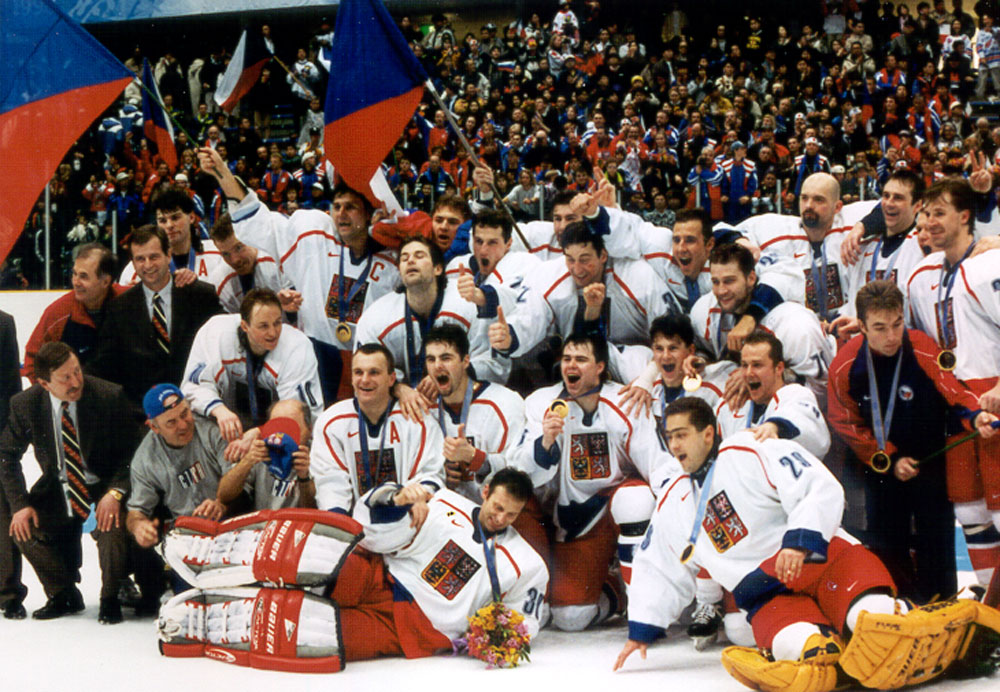
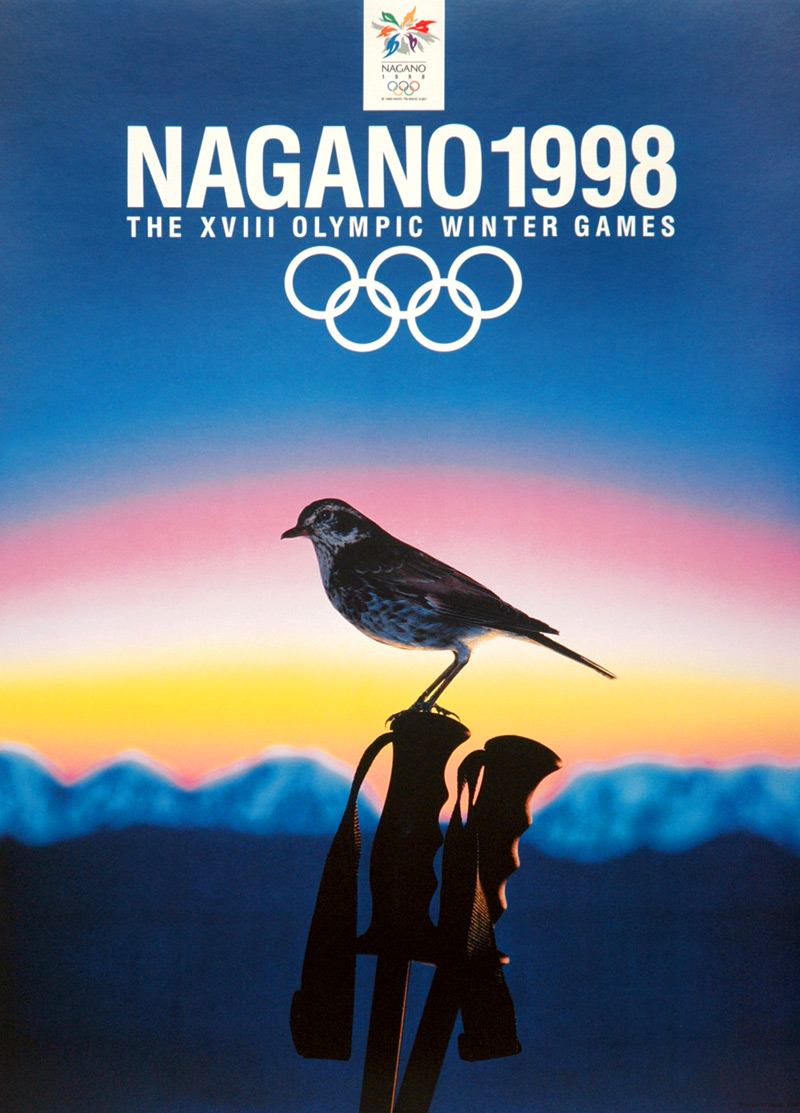
Team Czech Republic
Team Russia
Team Finland
These Games marked the first time NHL players were allowed to compete in the tournament. Surprise winners of the two preliminary round groups were Belarus and Kazakhstan, two former republics of the Soviet Union. Neither team however earned any victories in the final round. Buffalo Sabres star Dominik Hasek solidified his place as the world's top netminder by leading the Czech Republic to a surprise gold medal.
Since they had only 11 NHL players on their roster, the Czechs were rated no better than sixth in the 14-team competition. Hasek quickly enhanced that ranking by shutting out Finland 1-0 on opening day, beating the World Cup champion United States 4-1 in the quarterfinals and performing miracles in a 2-1 shoot-out upset of pre-tournament favourite Canada in the semifinals.

Team Czech Republic
Team Russia
Team Finland
Then with the gold medal on the line, Hasek blanked Russia 1-0 sending fans back home in Prague into hysterics. Defenseman Petr Svoboda scored the only goal of the game in the third period. Russia, which defeated the Czechs 2-1 earlier in the tournament, wound up with the silver medal and Finland surprised Canada 3-2 behind the standout goaltending of third-stringer Ari Sulander to win the bronze.
The gold-medalists' victory over Canada was particularly memorable. Czech defenseman Jiri Slegr broke open a scoreless tie with a goal midway through the third period. Trevor Linden tied the score for Canada late in the game to force overtime. When both teams failed to score in a 10-minute extra period, a shoot-out followed. Robert Reichel of the Czech Republic was the only player to score. Hasek stopped five of the NHL's best players - Theoren Fleury, Ray Bourque, Joe Nieuwendyk, Eric Lindros and Brendan Shanahan.
| Rank | Country | Games | Wins | Losses | OT Losses | Points |
|---|---|---|---|---|---|---|
| 1 | Czech Republic | 3 | 2 | 1 | 0 | 4 |
| 2 | Russia | 3 | 3 | 0 | 0 | 6 |
| 3 | Finland | 3 | 1 | 2 | 0 | 2 |
| 4 | Canada | 3 | 3 | 0 | 0 | 6 |
| 5 | Belarus | 6 | 2 | 3 | 1 | 5 |
| 5 | Kazakhstan | 6 | 2 | 3 | 1 | 5 |
| 5 | Sweden | 3 | 2 | 1 | 0 | 4 |
| 5 | USA | 3 | 1 | 2 | 0 | 2 |
| 9 | Germany | 3 | 2 | 1 | 0 | 4 |
| 10 | Slovakia | 3 | 1 | 1 | 1 | 3 |
| 11 | France | 3 | 1 | 2 | 0 | 2 |
| 12 | Italy | 3 | 1 | 2 | 0 | 2 |
| 13 | Japan | 3 | 0 | 2 | 1 | 1 |
| 14 | Austria | 3 | 0 | 1 | 2 | 2 |
Chronology
| Description | Team | Score | Team | Score |
|---|---|---|---|---|
| Preliminary Round | Kazakhstan | 5 | Italy | 3 |
| Preliminary Round | Germany | 3 | Japan | 1 |
| Preliminary Round | Austria | 2 | Slovakia | 2 |
| Preliminary Round | Belarus | 4 | France | 0 |
| Preliminary Round | Austria | 5 | Kazakhstan | 5 |
| Preliminary Round | Slovakia | 4 | Italy | 3 |
| Preliminary Round | Belarus | 8 | Germany | 2 |
| Preliminary Round | France | 5 | Japan | 2 |
| Preliminary Round | Belarus | 2 | Japan | 2 |
| Preliminary Round | Italy | 5 | Austria | 2 |
| Preliminary Round | Kazakhstan | 4 | Slovakia | 3 |
| Preliminary Round | Germany | 2 | France | 0 |
| Preliminary Round | Sweden | 4 | USA | 2 |
| Preliminary Round | Czech Republic | 3 | Finland | 0 |
| Preliminary Round | Canada | 5 | Belarus | 0 |
| Preliminary Round | Russia | 9 | Kazakhstan | 2 |
| Preliminary Round | USA | 5 | Belarus | 2 |
| Preliminary Round | Canada | 3 | Sweden | 2 |
| Preliminary Round | Russia | 4 | Finland | 3 |
| Preliminary Round | Czech Republic | 8 | Kazakhstan | 2 |
| Preliminary Round | Canada | 4 | USA | 1 |
| Preliminary Round | Russia | 2 | Czech Republic | 1 |
| Preliminary Round | Finland | 8 | Kazakhstan | 2 |
| Preliminary Round | Sweden | 5 | Belarus | 2 |
| Description | Team | Score | Team | Score |
|---|---|---|---|---|
| 9th-10th place | Germany | 4 | Slovakia | 2 |
| 11th-12th place | France | 5 | Italy | 1 |
| 13th-14th place | Japan | 4 | Austria | 3 |
| Quarterfinals | Canada | 4 | Kazakhstan | 1 |
| Quarterfinals | Czech Republic | 4 | USA | 1 |
| Quarterfinals | Finland | 2 | Sweden | 1 |
| Quarterfinals | Russia | 4 | Belarus | 1 |
| Semifinals | Czech Republic | 2 | Canada | 1 |
| Semifinals | Russia | 7 | Finland | 4 |
| 3rd-4th place | Finland | 3 | Canada | 2 |
| 1st-2nd place | Czech Republic | 1 | Russia | 0 |
Statistical Leaders
Top 15 Total Point Leaders
| Player | Country | No. | GP | G | A | P | PIM |
|---|---|---|---|---|---|---|---|
| SELANNE, Teemu | Finland | 8 | 5 | 4 | 6 | 10 | 8 |
| KOIVU, Saku | Finland | 11 | 6 | 2 | 8 | 10 | 4 |
| BURE, Pavel | Russia | 10 | 6 | 9 | 0 | 9 | 2 |
| KORESHKOV, Alexander | Kazakhstan | 17 | 7 | 3 | 6 | 9 | 2 |
| BOZON, Philippe | France | 12 | 4 | 5 | 2 | 7 | 4 |
| SHAFRANOV, Konstantin | Kazakhstan | 29 | 7 | 4 | 3 | 7 | 6 |
| LAVOIE, Dominik | Austria | 6 | 4 | 5 | 1 | 6 | 8 |
| LEHTINEN, Jere | Finland | 20 | 6 | 4 | 2 | 6 | 2 |
| YASHIN, Alexei | Russia | 19 | 6 | 3 | 3 | 6 | 0 |
| POUDRIER, Serge | France | 27 | 6 | 2 | 4 | 6 | 4 |
| FEDOROV, Sergei | Russia | 91 | 6 | 1 | 5 | 6 | 8 |
| KOVALENKO, Andrei | Russia | 51 | 6 | 4 | 1 | 5 | 14 |
| FIGLIUZZI, Stefan | Italy | 91 | 4 | 3 | 2 | 5 | 2 |
| LINDROS, Eric | Canada | 88 | 6 | 2 | 3 | 5 | 2 |
| NIEUWENDYK, Joe | Canada | 25 | 6 | 2 | 3 | 5 | 2 |
Top 5 Goal Scorers
| Player | Country | No. | GP | G |
|---|---|---|---|---|
| BURE, Pavel | Russia | 10 | 6 | 9 |
| BOZON, Philippe | France | 12 | 4 | 5 |
| LAVOIE, Dominik | Austria | 6 | 4 | 5 |
| SHAFRANOV, Konstantin | Kazakhstan | 29 | 7 | 4 |
| KOVALENKO, Andrei | Russia | 51 | 6 | 4 |
Top 5 Assist Leaders
| Player | Country | No. | GP | A |
|---|---|---|---|---|
| KOIVU, Saku | Finland | 11 | 6 | 8 |
| KORESHKOV, Alexander | Kazakhstan | 17 | 7 | 6 |
| SELANNE, Teemu | Finland | 8 | 5 | 6 |
| FEDOROV, Sergei | Russia | 91 | 6 | 5 |
| GRETZKY, Wayne | Canada | 99 | 6 | 4 |
Top 10 Leading Goaltenders
| Player | Country | No. | GPT | GKD | GPI | MIP | MIP% | GA | SVS | SOG | SVS% | GAA | SO | W | T | L |
|---|---|---|---|---|---|---|---|---|---|---|---|---|---|---|---|---|
| HASEK, Dominik | Czech Republic | 39 | 6 | - | - | 369 | - | 6 | - | - | - | 0.97 | - | - | - | - |
| KOLZIG, Olaf | Germany | 1 | 2 | - | - | 120 | - | 2 | - | - | - | 1.00 | - | - | - | - |
| HEISS, Josef | Germany | 30 | 1 | - | - | 60 | - | 1 | - | - | - | 1.00 | - | - | - | - |
| ROY, Patrick | Canada | 33 | 6 | - | - | 369 | - | 9 | - | - | - | 1.46 | - | - | - | - |
| SHTALENKOV, Mikhail | Russia | 35 | 5 | - | - | 290 | - | 8 | - | - | - | 1.65 | - | - | - | - |
| SHUMIDUB, Alexander | Belarus | 1 | 2 | - | - | 64 | - | 2 | - | - | - | 1.87 | - | - | - | - |
| SULANDER, Ari | Finland | 31 | 2 | - | - | 120 | - | 4 | - | - | - | 2.00 | - | - | - | - |
| GRAVEL, Francois | France | 29 | 2 | - | - | 119 | - | 4 | - | - | - | 2.01 | - | - | - | - |
| SALO, Tommy | Sweden | 35 | 4 | - | - | 238 | - | 9 | - | - | - | 2.27 | - | - | - | - |
| HUET, Christobal | France | 1 | 2 | - | - | 120 | - | 5 | - | - | - | 2.50 | - | - | - | - |
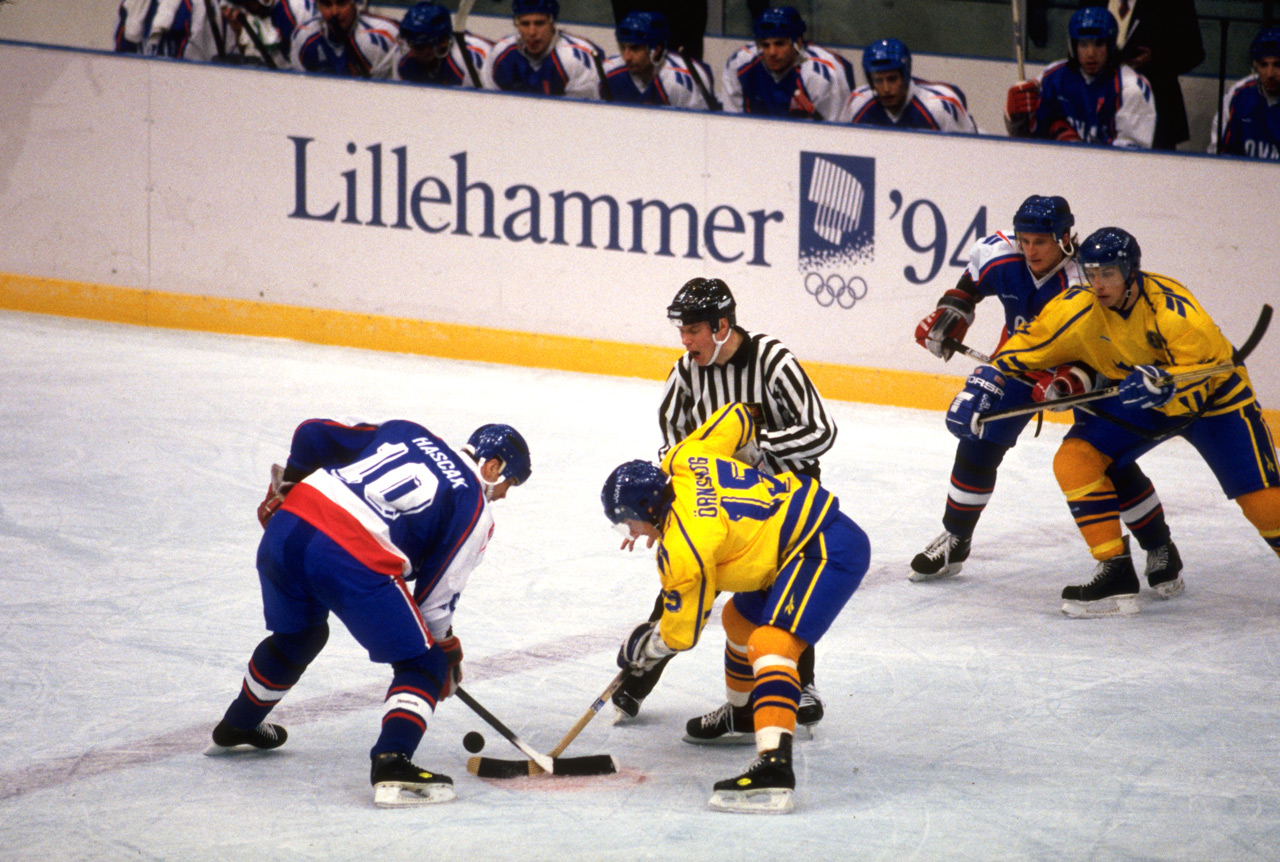
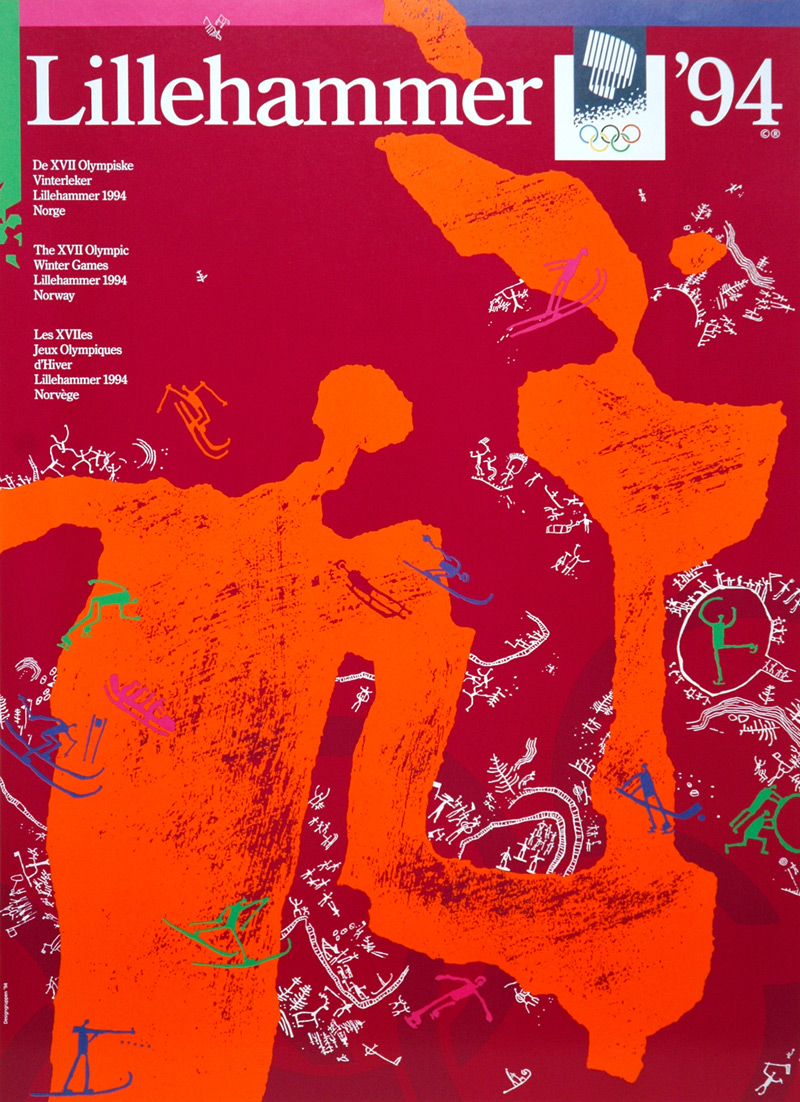
Team Sweden
Team Canada
Team Finland
Following the IOC decision to stage Winter and Summer Olympic Games in staggered years, these Games took place just two years after the last competition in France in 1992. One of the most indelible images in Olympic hockey history showed Sweden's Peter Forsberg pushing the puck past Canadian goalie Corey Hirsch with one hand on the stick while Hirsch made a last-minute lunge to block it. Forsberg's goal in the second round of a shoot-out of the gold medal game gave Sweden its first Olympic championship.
Canada's Paul Kariya had a chance to prolong the shoot-out but was outguessed by Swedish goalie Tommy Salo. Kariya had put Canada ahead 2-1 at 9:08 of the third period before Magnus Svensson connected on a power play goal for Sweden with less than two minutes to play to force overtime. Neither team was able to score in the extra session.

Team Sweden
Team Canada
Team Finland
Three players on the Swedish team - Tomas Jonsson, Hakan Loob, and Mats Naslund - became the first players to win World, Olympic, and Stanley Cup titles in three separate tournaments. Slovakia, competing in its first Olympics as a nation, and Finland had been the surprise group winners in preliminary round play. But the Peter Stastny-led Slovaks lost 3-2 in overtime to Russia in the quarterfinals and Finland, which had allowed just five goals in its previous six games, fell to Canada 5-3 in the semis.
Although Slovakia failed to make it to the final four, two of its players had exceptional tournaments. Zigmund Palffy was the tournament scoring champion with 10 points in six games and Miroslav Satan led the way in goals with nine. Russia, playing in the Olympics without the help of stars from the former Soviet Republics, lost 4-0 to Finland in the bronze-medal game and finished out of the medals for the first time in the history of Soviet/Russian hockey.
| Rank | Country | Games | Wins | Losses | OT Losses | Points |
|---|---|---|---|---|---|---|
| 1 | Sweden | 7 | 5 | 1 | 1 | 11 |
| 2 | Canada | 8 | 5 | 2 | 1 | 11 |
| 3 | Finland | 8 | 7 | 1 | 0 | 14 |
| 4 | Russia | 8 | 4 | 4 | 0 | 8 |
| 5 | Czech Republic | 8 | 5 | 3 | 0 | 10 |
| 6 | Slovakia | 12 | 7 | 2 | 3 | 17 |
| 7 | Germany | 8 | 4 | 4 | 0 | 8 |
| 8 | USA | 7 | 1 | 3 | 3 | 5 |
| 9 | Italy | 7 | 3 | 4 | 0 | 6 |
| 10 | France | 7 | 1 | 5 | 1 | 3 |
| 11 | Norway | 7 | 1 | 6 | 0 | 2 |
| 12 | Austria | 7 | 1 | 6 | 0 | 2 |
| N/R | Great Britain | 4 | 0 | 3 | 1 | 1 |
| N/R | Japan | 4 | 1 | 3 | 0 | 2 |
| N/R | Latvia | 4 | 3 | 1 | 0 | 6 |
| N/R | Poland | 4 | 1 | 1 | 2 | 4 |
Chronology
| Description | Team | Score | Team | Score | Comments |
|---|---|---|---|---|---|
| Qualification Games | Poland | 2 | Great Britain | 2 | |
| Qualification Games | Japan | 2 | Slovakia | 7 | |
| Qualification Games | Latvia | 6 | Poland | 2 | |
| Qualification Games | Great Britain | 2 | Japan | 4 | |
| Qualification Games | Slovakia | 4 | Poland | 4 | |
| Qualification Games | Great Britain | 4 | Latvia | 8 | |
| Qualification Games | Poland | 6 | Japan | 4 | |
| Qualification Games | Latvia | 1 | Slovakia | 7 | |
| Qualification Games | Japan | 1 | Latvia | 7 | |
| Qualification Games | Slovakia | 7 | Great Britain | 1 | |
| Group A | Czech Republic | 1 | Finland | 3 | |
| Group A | Norway | 1 | Russia | 5 | |
| Group A | Germany | 4 | Austria | 3 | |
| Group A | Norway | 1 | Germany | 2 | |
| Group A | Austria | 3 | Czech Republic | 7 | |
| Group A | Finland | 5 | Russia | 0 | |
| Group A | Russia | 9 | Austria | 1 | |
| Group A | Germany | 0 | Czech Republic | 1 | |
| Group A | Finland | 4 | Norway | 0 | |
| Group A | Russia | 2 | Germany | 4 | |
| Group A | Austria | 2 | Finland | 6 | |
| Group A | Norway | 1 | Czech Republic | 4 | |
| Group A | Czech Republic | 3 | Russia | 4 | |
| Group A | Finland | 7 | Germany | 1 | |
| Group A | Austria | 4 | Norway | 2 |
| Description | Team | Score | Team | Score | Comments |
|---|---|---|---|---|---|
| Group B | Slovakia | 4 | Sweden | 4 | |
| Group B | Canada | 7 | Italy | 2 | |
| Group B | USA | 4 | France | 4 | |
| Group B | Italy | 1 | Sweden | 4 | |
| Group B | Slovakia | 3 | USA | 3 | |
| Group B | France | 1 | Canada | 3 | |
| Group B | Italy | 4 | Slovakia | 10 | |
| Group B | Sweden | 7 | France | 1 | |
| Group B | USA | 3 | Canada | 3 | |
| Group B | Slovakia | 3 | Canada | 1 | |
| Group B | France | 3 | Italy | 7 | |
| Group B | Canada | 3 | Sweden | 2 | |
| Group B | France | 2 | Slovakia | 6 | |
| Group B | Italy | 1 | USA | 7 | |
| Quarterfinals | Czech Republic | 2 | Canada | 3 | OT |
| Quarterfinals | USA | 1 | Finland | 6 | |
| Quarterfinals | Sweden | 3 | Germany | 0 | |
| Quarterfinals | Russia | 3 | Slovakia | 2 | OT |
| 9th to 12th place | France | 5 | Austria | 4 | Shootout |
| 9th to 12th place | Norway | 3 | Italy | 6 | |
| 9th-10th place | Italy | 3 | France | 2 | |
| 11th-12th place | Austria | 1 | Norway | 3 | |
| 5th to 8th place | USA | 3 | Czech Republic | 5 | |
| 5th to 8th place | Slovakia | 6 | Germany | 5 | OT |
| 7th-8th place | USA | 3 | Germany | 4 | |
| 5th-6th place | Slovakia | 1 | Czech Republic | 7 | |
| Semifinals | Canada | 5 | Finland | 3 | |
| Semifinals | Sweden | 4 | Russia | 3 | |
| 3rd-4th place | Finland | 4 | Russia | 0 | |
| Final | Sweden | 3 | Canada | 2 | Shootout |
Statistical Leaders
Top 15 Total Point Leaders
| Player | Country | No. | GP | G | A | P | PIM |
|---|---|---|---|---|---|---|---|
| PALFFY, Zigmund | Slovakia | 68 | 8 | 3 | 7 | 10 | 8 |
| SATAN, Miroslav | Slovakia | 18 | 8 | 9 | 0 | 9 | 0 |
| STASTNY, Peter | Slovakia | 26 | 8 | 5 | 4 | 9 | 9 |
| LOOB, Hakan | Sweden | 12 | 8 | 4 | 5 | 9 | 2 |
| ORLANDO, Gaetano | Italy | 17 | 7 | 3 | 6 | 9 | 4 |
| JUHLIN, Patrik | Sweden | 5 | 8 | 7 | 1 | 8 | 16 |
| KUCERA, Jiri | Czech Republic | 21 | 8 | 6 | 2 | 8 | 4 |
| DALLMAN, Marty | Austria | 11 | 7 | 4 | 4 | 8 | 8 |
| SACCO, David | USA | 16 | 8 | 3 | 5 | 8 | 12 |
| NIEMINEN, Mika | Finland | 40 | 8 | 3 | 5 | 8 | 0 |
| FORSBERG, Peter | Sweden | 21 | 8 | 2 | 6 | 8 | 6 |
| ROLSTON, Brian | USA | 11 | 8 | 7 | 0 | 7 | 8 |
| HANSSON, Roger | Sweden | 11 | 8 | 5 | 2 | 7 | 4 |
| PELTONEN, Ville | Finland | 16 | 8 | 4 | 3 | 7 | 0 |
| KOIVU, Saku | Finland | 11 | 8 | 4 | 3 | 7 | 12 |
Top 5 Goal Scorers
| Player | Country | No. | GP | G |
|---|---|---|---|---|
| SATAN, Miroslav | Slovakia | 18 | 8 | 9 |
| JUHLIN, Patrik | Sweden | 5 | 8 | 7 |
| ROLSTON, Brian | USA | 11 | 8 | 7 |
| FERRARO, Peter | USA | 17 | 8 | 6 |
| KUCERA, Jiri | Czech Republic | 21 | 8 | 6 |
Top 5 Assist Leaders
| Player | Country | No. | GP | A |
|---|---|---|---|---|
| PALFFY, Zigmund | Slovakia | 68 | 8 | 7 |
| NASLUND, Mats | Sweden | 26 | 8 | 7 |
| FORSBERG, Peter | Sweden | 21 | 8 | 6 |
| PETROVICKY, Robert | Slovakia | 39 | 8 | 6 |
| ORLANDO, Gaetano | Italy | 17 | 7 | 6 |
Top 10 Leading Goaltenders
| Player | Country | No. | GPT | GKD | GPI | MIP | MIP% | GA | SVS | SOG | SVS% | GAA | SO | W | T | L |
|---|---|---|---|---|---|---|---|---|---|---|---|---|---|---|---|---|
| MYLLYS, Jarmo | Finland | 35 | 5 | - | - | 300 | - | 3 | - | - | - | 0.60 | - | - | - | - |
| TUREK, Roman | Czech Republic | 2 | 2 | - | - | 120 | - | 3 | - | - | - | 2.00 | - | - | - | - |
| HIRSCH, Corey | Canada | 1 | 8 | - | - | 495 | - | 18 | - | - | - | 2.06 | - | - | - | - |
| SALO, Tommy | Sweden | 35 | 6 | - | - | 370 | - | 13 | - | - | - | 2.11 | - | - | - | - |
| ABRAMOV, Sergei | Russia | 30 | 3 | - | - | 140 | - | 5 | - | - | - | 2.14 | - | - | - | - |
| TAMMI, Jukka | Finland | 30 | 3 | - | - | 179 | - | 7 | - | - | - | 2.34 | - | - | - | - |
| BRIZA, Petr | Czech Republic | 1 | 7 | - | - | 381 | - | 15 | - | - | - | 2.36 | - | - | - | - |
| ALGOTSSON, Hakan | Sweden | 1 | 2 | - | - | 120 | - | 5 | - | - | - | 2.50 | - | - | - | - |
| MERK, Klaus | Germany | 27 | 3 | - | - | 180 | - | 8 | - | - | - | 2.67 | - | - | - | - |
| MICHALEK, Miroslav | Slovakia | 23 | 2 | - | - | 100 | - | 5 | - | - | - | 3.00 | - | - | - | - |
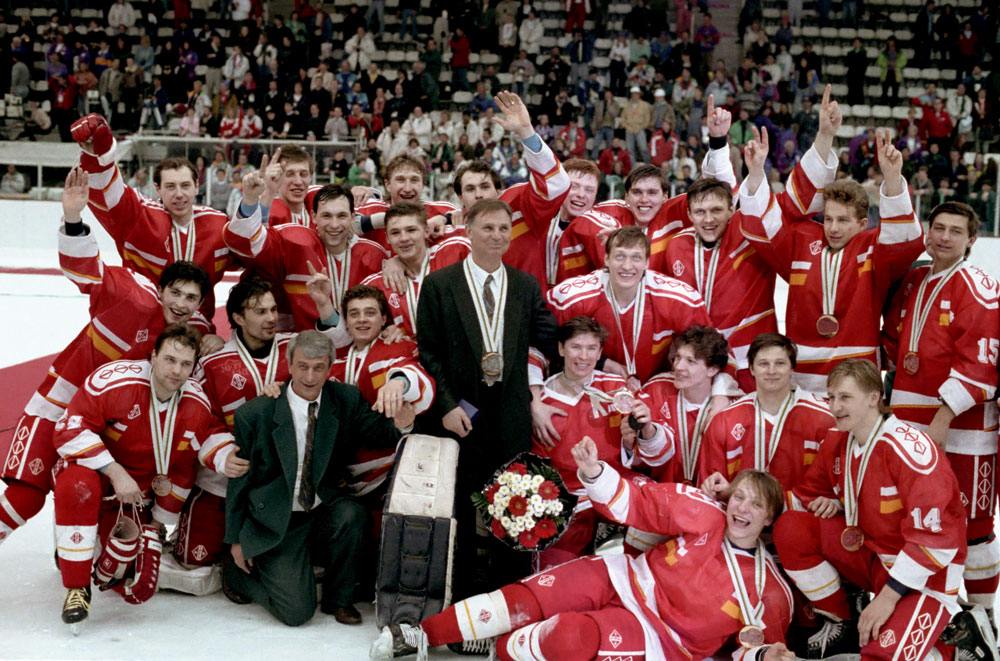
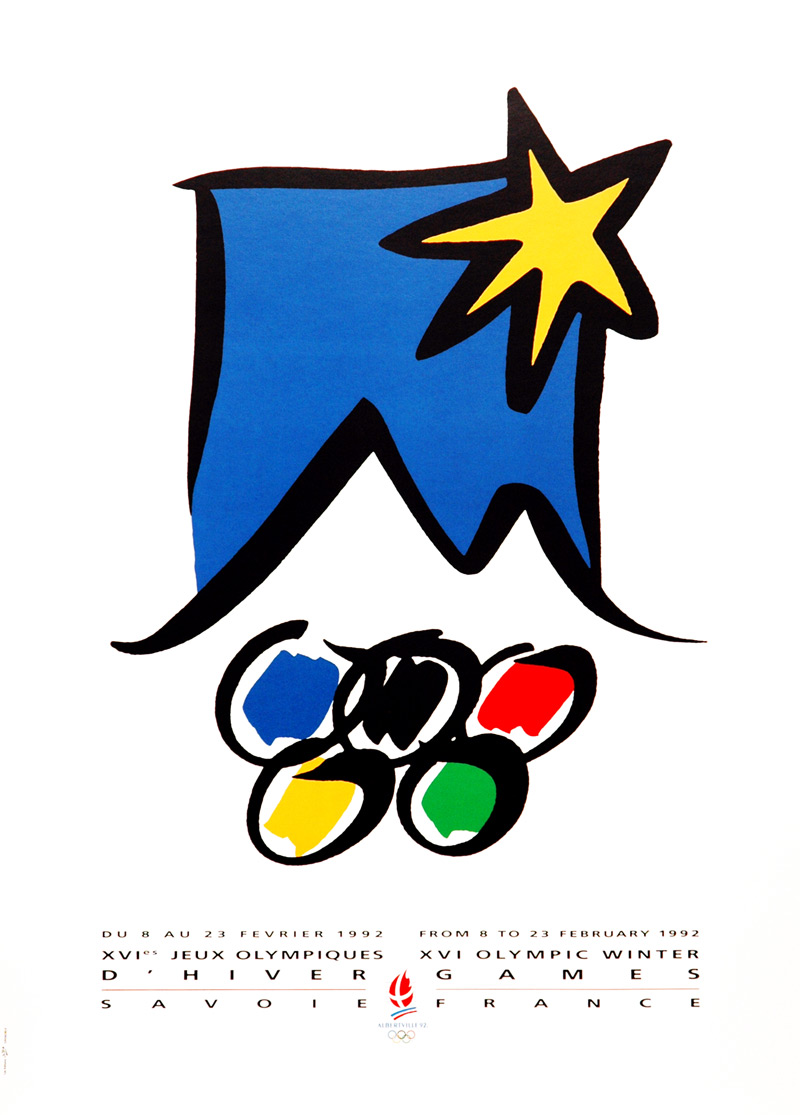
Team Russia
Team Canada
Team Czechoslovakia
Following the breakup of the Soviet Union, the former Soviet Olympic committee decided to call its delegation to the Winter Games the "Unified Team" because several athletes in various sports were from former Soviet republics.
The hockey team played with no logo on its uniform and no national anthem was played when the former Soviets won the gold medal. The Olympic anthem was played instead. Vyacheslav Bykov, the diminutive captain, was the inspirational leader of the Olympic champions and 20 of the 23 players from their roster eventually played in the NHL.
The 1992 Olympic hockey tournament adopted a playoff system for the first time in the post-War era. The one-game elimination playoff system included eight teams in the quarterfinals and saw the four teams with the best records in the preliminary round reach the semifinals.

Team Russia
Team Canada
Team Czechoslovakia
Forty years after the Edmonton Mercurys won Canada's last Olympic gold medal, Dave King's Canadian national team made it to the final game. The game remained scoreless after the second period but the Unified Team of former Soviet players outscored their Canadian opponents 3-1 to win the championship.
Led by future NHL stars Joe Juneau and Eric Lindros, Canada advanced to the finals with a thrilling shoot-out win over Germany in the quarterfinals and upset a more experienced team from Czechoslovakia 4-2 in the semifinals. Future NHLer Robert Lang starred in the tournament for Czechoslovakia, which breezed to a 6-1 victory over a talented group of American collegians in the bronze medal game. The U.S. had finished first in its group in the preliminary round and defeated France 4-1 in the quarterfinals before bowing 5-2 to the Unified Team in the semis.
| Rank | Country | Games | Wins | Losses | OT Losses | Points |
|---|---|---|---|---|---|---|
| 1 | Russia | 8 | 7 | 1 | 0 | 14 |
| 2 | Canada | 8 | 6 | 2 | 0 | 12 |
| 3 | Czechoslovakia | 8 | 6 | 2 | 0 | 12 |
| 4 | USA | 8 | 5 | 2 | 1 | 11 |
| 5 | Sweden | 8 | 5 | 1 | 2 | 12 |
| 6 | Germany | 8 | 3 | 5 | 0 | 6 |
| 7 | Finland | 8 | 4 | 3 | 1 | 9 |
| 8 | France | 8 | 2 | 6 | 0 | 4 |
| 9 | Norway | 7 | 2 | 5 | 0 | 4 |
| 10 | Switzerland | 7 | 2 | 5 | 0 | 4 |
| 11 | Poland | 7 | 1 | 6 | 0 | 2 |
| 12 | Italy | 7 | 1 | 6 | 0 | 2 |
Chronology
| Description | Team | Score | Team | Score |
|---|---|---|---|---|
| Group A | Poland | 2 | Sweden | 7 |
| Group A | Finland | 5 | Germany | 1 |
| Group A | USA | 6 | Italy | 3 |
| Group A | Poland | 1 | Finland | 9 |
| Group A | Germany | 0 | USA | 2 |
| Group A | Italy | 3 | Sweden | 7 |
| Group A | Italy | 7 | Poland | 1 |
| Group A | Finland | 1 | USA | 4 |
| Group A | Sweden | 3 | Germany | 1 |
| Group A | Germany | 5 | Italy | 2 |
| Group A | Sweden | 2 | Finland | 2 |
| Group A | Poland | 0 | USA | 3 |
| Group A | Germany | 4 | Poland | 0 |
| Group A | Italy | 3 | Finland | 5 |
| Group A | USA | 3 | Sweden | 3 |
| Group B | France | 2 | Canada | 3 |
| Group B | Czechoslovakia | 10 | Norway | 1 |
| Group B | Russia | 8 | Switzerland | 1 |
| Group B | Norway | 1 | Russia | 8 |
| Group B | France | 4 | Czechoslovakia | 6 |
| Group B | Switzerland | 1 | Canada | 6 |
| Group B | Canada | 10 | Norway | 0 |
| Group B | Switzerland | 3 | France | 4 |
| Group B | Czechoslovakia | 4 | Russia | 3 |
| Group B | France | 0 | Russia | 8 |
| Group B | Norway | 3 | Switzerland | 6 |
| Group B | Canada | 5 | Czechoslovakia | 1 |
| Group B | Norway | 2 | France | 4 |
| Group B | Switzerland | 2 | Czechoslovakia | 4 |
| Group B | Russia | 5 | Canada | 4 |
| Description | Team | Score | Team | Score |
|---|---|---|---|---|
| Quarterfinals | Germany | 3 | Canada | 4 |
| Quarterfinals | France | 1 | USA | 4 |
| Quarterfinals | Finland | 1 | Russia | 6 |
| Quarterfinals | Czechoslovakia | 3 | Sweden | 1 |
| 5th to 8th place | Finland | 2 | Sweden | 3 |
| 5th to 8th place | France | 4 | Germany | 5 |
| 5th-6th place | Germany | 3 | Sweden | 4 |
| 7th-8th place | Finland | 4 | France | 1 |
| 9th to 12th place | Norway | 5 | Italy | 3 |
| 9th to 12th place | Poland | 2 | Switzerland | 7 |
| 9th-10th place | Switzerland | 2 | Norway | 5 |
| 11th-12th place | Poland | 4 | Italy | 1 |
| Semifinals | Russia | 5 | USA | 2 |
| Semifinals | Czechoslovakia | 2 | Canada | 4 |
| 3rd-4th place | Czechoslovakia | 6 | USA | 1 |
| Final | Canada | 1 | Russia | 3 |
Statistical Leaders
Top 15 Total Point Leaders
| Player | Country | No. | GP | G | A | P | PIM |
|---|---|---|---|---|---|---|---|
| JUNEAU, Joe | Canada | 9 | 8 | 6 | 9 | 15 | 4 |
| KHOMUTOV, Andrei | Russia | 15 | 8 | 7 | 7 | 14 | 2 |
| LANG, Robert | Czechoslovakia | 11 | 8 | 5 | 8 | 13 | 8 |
| SELANNE, Teemu | Finland | 8 | 8 | 7 | 4 | 11 | 6 |
| LINDROS, Eric | Canada | 88 | 8 | 5 | 6 | 11 | 5 |
| JARVENPAA, Hannu | Finland | 15 | 8 | 5 | 6 | 11 | 14 |
| BYKOV, Vyacheslav | Russia | 27 | 8 | 4 | 7 | 11 | 0 |
| KHMYLEV, Yuri | Russia | 13 | 8 | 4 | 6 | 10 | 4 |
| NIEMINEN, Mika | Finland | 40 | 8 | 4 | 6 | 10 | 6 |
| BORSCHEVSKY, Nikolai | Russia | 12 | 8 | 7 | 2 | 9 | 0 |
| ARCHIBALD, Dave | Canada | 12 | 8 | 7 | 1 | 8 | 18 |
| ROSOL, Petr | Czechoslovakia | 10 | 7 | 6 | 2 | 8 | 6 |
| LOOB, Hakan | Sweden | 12 | 8 | 4 | 4 | 8 | 0 |
| HANNAN, Dave | Canada | 10 | 8 | 3 | 5 | 8 | 8 |
| BOLDIN, Igor | Russia | 8 | 8 | 2 | 6 | 8 | 0 |
Top 5 Goal Scorers
| Player | Country | No. | GP | G |
|---|---|---|---|---|
| ARCHIBALD, Dave | Canada | 12 | 8 | 7 |
| BORSCHEVSKY, Nikolai | Russia | 12 | 8 | 7 |
| SELANNE, Teemu | Finland | 8 | 8 | 7 |
| KHOMUTOV, Andrei | Russia | 15 | 8 | 7 |
| JUNEAU, Joe | Canada | 9 | 8 | 6 |
Top 5 Assist Leaders
| Player | Country | No. | GP | A |
|---|---|---|---|---|
| JUNEAU, Joe | Canada | 9 | 8 | 9 |
| LANG, Robert | Czechoslovakia | 11 | 8 | 8 |
| SMITH, Randy | Canada | 22 | 8 | 7 |
| BYKOV, Vyacheslav | Russia | 27 | 8 | 7 |
| KHOMUTOV, Andrei | Russia | 15 | 8 | 7 |
Top 10 Leading Goaltenders
| Player | Country | No. | GPT | GKD | GPI | MIP | MIP% | GA | SVS | SOG | SVS% | GAA | SO | W | T | L |
|---|---|---|---|---|---|---|---|---|---|---|---|---|---|---|---|---|
| SHTALENKOV, Mikhail | Russia | 20 | 8 | - | - | 440 | - | 12 | - | - | - | 1.64 | - | - | - | - |
| DE RAAF, Helmut | Germany | - | 4 | - | - | 250 | - | 8 | - | - | - | 1.92 | - | - | - | - |
| SVOBODA, Oldrich | Czechoslovakia | 2 | 1 | - | - | 60 | - | 2 | - | - | - | 2.00 | - | - | - | - |
| NORDSTROM, Roger | Sweden | 1 | 3 | - | - | 179 | - | 6 | - | - | - | 2.01 | - | - | - | - |
| LEBLANC, Ray | USA | 1 | 8 | - | - | 463 | - | 17 | - | - | - | 2.20 | - | - | - | - |
| BURKE, Sean | Canada | 1 | 7 | - | - | 429 | - | 17 | - | - | - | 2.37 | - | - | - | - |
| TAMMI, Jukka | Finland | 1 | 5 | - | - | 299 | - | 13 | - | - | - | 2.61 | - | - | - | - |
| SODERSTROM, Tommy | Sweden | 30 | 5 | - | - | 298 | - | 13 | - | - | - | 2.62 | - | - | - | - |
| KETTERER, Markus | Finland | 30 | 3 | - | - | 180 | - | 8 | - | - | - | 2.67 | - | - | - | - |
| BRIZA, Petr | Czechoslovakia | 1 | 7 | - | - | 419 | - | 19 | - | - | - | 2.72 | - | - | - | - |
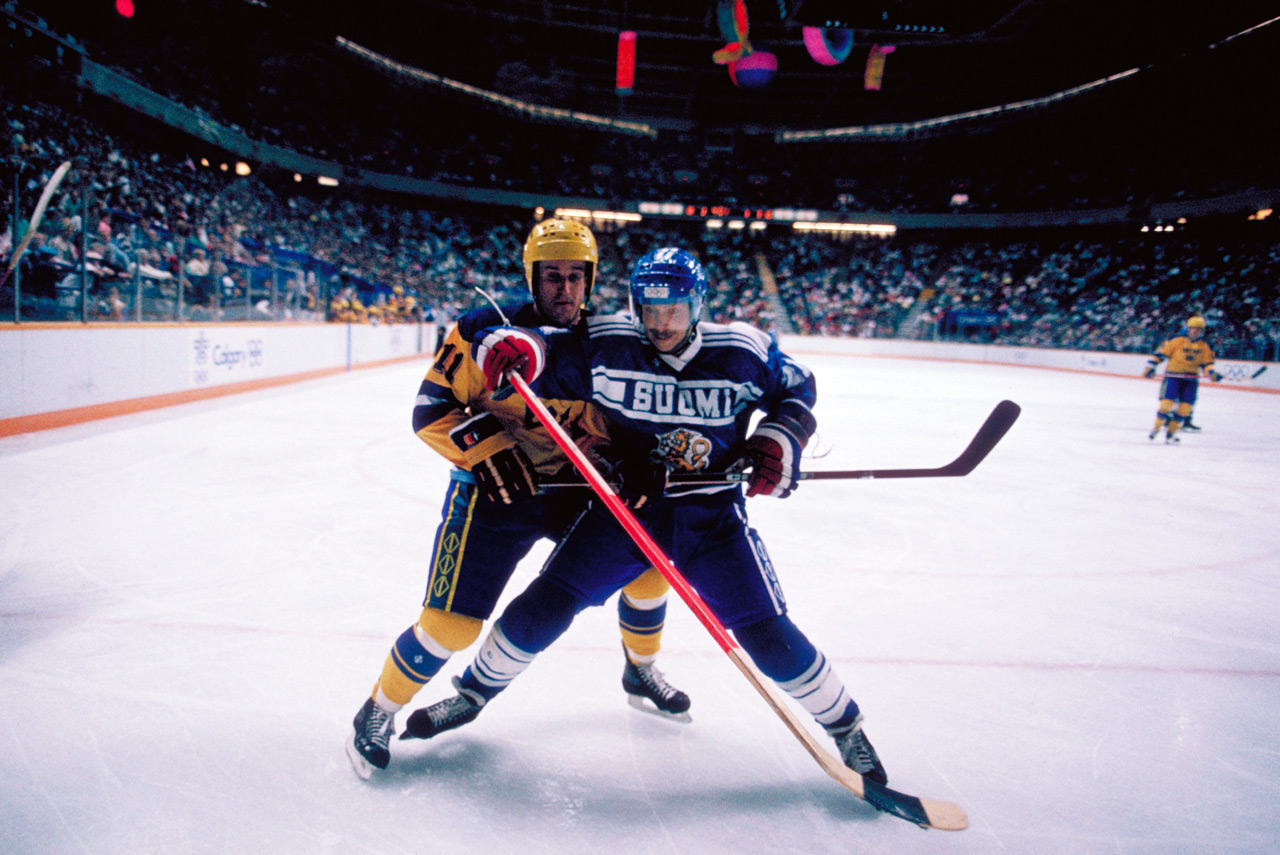
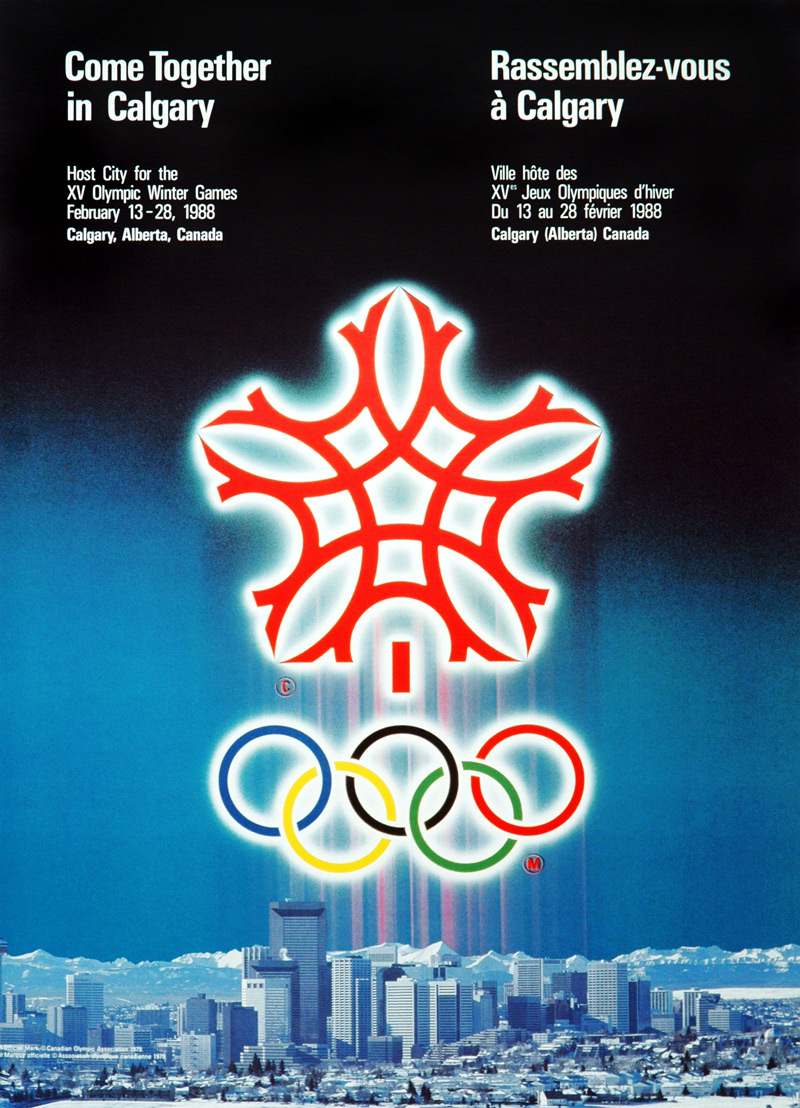
Team USSR
Team Finland
Team Sweden
Several months before the start of the tournament, the decision was made to allow teams to include professional players on their rosters. This made it possible for NHL players like goalie Andy Moog, who was involved in a contract dispute with the Edmonton Oilers, to join the Canadian Olympic Team. Oilers teammate Randy Gregg also joined the team, as did Brian Bradley of the Calgary Flames and Ken Yaremchuk of the Toronto Maple Leafs. A few days prior to the competition, Tim Watters (Winnipeg Jets), Steve Tambellini (Vancouver Canucks) and Jim Peplinski (Calgary Flames) were added to the Canadian roster.
In the aftermath of its disappointing showing at the 1987 World Championships, the USSR appeared less formidable entering the Olympic tournament. During the preliminary round they struggled to beat the United States 7-5 and West Germany 6-3. However the Soviets played their best hockey when it counted most. They silenced a sell-out crowd by blanking Canada 5-0 in its first medal round game, then clinched the gold medal by trouncing Sweden 7-1. By starting Sergei Mylnikov in goal, the champions won their first title in twenty years without the legendary Vladislav Tretiak.

Team USSR
Team Finland
Team Sweden
Finland, with Jukka Tammi starring in goal upset the Soviets 2-1 on closing day which relegated Sweden to the bronze medal position. West Germany made an excellent showing, upsetting Czechoslovakia 2-1 before the Opening Ceremonies on February 13 and dashing American medal chances by defeating the U.S. 4-1 to qualify for the medal round.
Despite their professional reinforcements, Canada lost a key preliminary round game to Finland 3-1 and wound up out of the medals with a fourth-place finish.
| Rank | Country | Games | Wins | Losses | OT Losses | Points |
|---|---|---|---|---|---|---|
| 1 | USSR | 8 | 7 | 1 | 0 | 14 |
| 2 | Finland | 8 | 5 | 2 | 1 | 11 |
| 3 | Sweden | 8 | 4 | 1 | 3 | 11 |
| 4 | Canada | 8 | 5 | 2 | 1 | 11 |
| 5 | West Germany | 8 | 4 | 4 | 0 | 8 |
| 6 | Czechoslovakia | 8 | 4 | 4 | 0 | 8 |
| 7 | USA | 6 | 3 | 3 | 0 | 6 |
| 8 | Switzerland | 6 | 3 | 3 | 0 | 6 |
| 9 | Austria | 6 | 1 | 4 | 1 | 3 |
| 10 | Poland | 6 | 0 | 5 | 1 | 1 |
| 11 | France | 6 | 2 | 4 | 0 | 4 |
| 12 | Norway | 6 | 0 | 5 | 1 | 1 |
Chronology
| Description | Team | Score | Team | Score |
|---|---|---|---|---|
| Group A | France | 2 | Sweden | 13 |
| Group A | Canada | 1 | Poland | 0 |
| Group A | Finland | 1 | Switzerland | 2 |
| Group A | Poland | 1 | Sweden | 1 |
| Group A | Switzerland | 2 | Canada | 4 |
| Group A | France | 1 | Finland | 10 |
| Group A | Poland | 0 | France | 2 |
| Group A | Sweden | 4 | Switzerland | 2 |
| Group A | Finland | 3 | Canada | 1 |
| Group A | Sweden | 3 | Finland | 3 |
| Group A | Switzerland | 4 | Poland | 1 |
| Group A | France | 5 | Canada | 9 |
| Group A | Poland | 1 | Finland | 5 |
| Group A | Canada | 2 | Sweden | 2 |
| Group A | Switzerland | 9 | France | 0 |
| Group B | West Germany | 2 | Czechoslovakia | 1 |
| Group B | USSR | 5 | Norway | 0 |
| Group B | USA | 10 | Austria | 6 |
| Group B | West Germany | 7 | Norway | 3 |
| Group B | Austria | 1 | USSR | 8 |
| Group B | Czechoslovakia | 7 | USA | 5 |
| Group B | Austria | 1 | West Germany | 3 |
| Group B | Norway | 1 | Czechoslovakia | 10 |
| Group B | USA | 5 | USSR | 7 |
| Group B | Austria | 0 | Czechoslovakia | 4 |
| Group B | USSR | 6 | West Germany | 3 |
| Group B | Norway | 3 | USA | 6 |
| Group B | Czechoslovakia | 1 | USSR | 6 |
| Group B | Norway | 4 | Austria | 4 |
| Group B | USA | 1 | West Germany | 4 |
| Description | Team | Score | Team | Score |
|---|---|---|---|---|
| 11th-12th place | France | 8 | Norway | 6 |
| 9th-10th place | Austria | 3 | Poland | 2 |
| 7th-8th place | Switzerland | 4 | USA | 8 |
| 1st to 6th place | Czechoslovakia | 2 | Sweden | 6 |
| 1st to 6th place | West Germany | 0 | Finland | 8 |
| 1st to 6th place | Canada | 0 | USSR | 5 |
| 1st to 6th place | Canada | 8 | West Germany | 1 |
| 1st to 6th place | Finland | 2 | Czechoslovakia | 5 |
| 1st to 6th place | Sweden | 1 | USSR | 7 |
| 1st to 6th place | Czechoslovakia | 3 | Canada | 6 |
| 1st to 6th place | Sweden | 3 | West Germany | 2 |
| 1st to 6th place | USSR | 1 | Finland | 2 |
Statistical Leaders
Top 15 Total Point Leaders
| Player | Country | No. | GP | G | A | P | PIM |
|---|---|---|---|---|---|---|---|
| KRUTOV, Vladimir | USSR | 9 | 8 | 6 | 9 | 15 | 0 |
| FETISOV, Viacheslav | USSR | 2 | 8 | 4 | 9 | 13 | 6 |
| LARIONOV, Igor | USSR | 11 | 8 | 4 | 9 | 13 | 4 |
| PASEK, Dusan | Czechoslovakia | 21 | 8 | 6 | 5 | 11 | 8 |
| MILLEN, Corey | USA | 10 | 6 | 6 | 5 | 11 | 4 |
| MAKAROV, Sergei | USSR | 24 | 8 | 3 | 8 | 11 | 10 |
| ELDEBRINK, Anders | Sweden | 2 | 8 | 4 | 6 | 10 | 4 |
| LIBA, Igor | Czechoslovakia | 11 | 8 | 4 | 6 | 10 | 8 |
| LEHTONEN, Erkki | Finland | 21 | 8 | 4 | 6 | 10 | 2 |
| TRUNTSCHKA, Gerd | West Germany | 17 | 8 | 3 | 7 | 10 | 10 |
| HELMINEN, Raimo | Finland | 14 | 7 | 2 | 8 | 10 | 4 |
| BOISVERT, Serge | Canada | 12 | 8 | 7 | 2 | 9 | 2 |
| STAVJANA, Antonin | Czechoslovakia | 16 | 8 | 4 | 5 | 9 | 4 |
| HABSCHEID, Marc | Canada | 14 | 8 | 5 | 3 | 8 | 6 |
| EBERLE, Jorg | Switzerland | 24 | 6 | 5 | 3 | 8 | 6 |
Top 5 Goal Scorers
| Player | Country | No. | GP | G |
|---|---|---|---|---|
| BOISVERT, Serge | Canada | 12 | 8 | 7 |
| KRUTOV, Vladimir | USSR | 9 | 8 | 6 |
| PASEK, Dusan | Czechoslovakia | 21 | 8 | 6 |
| MILLEN, Corey | USA | 10 | 6 | 6 |
| MACDONALD, Lane | USA | 19 | 6 | 6 |
Top 5 Assist Leaders
| Player | Country | No. | GP | A |
|---|---|---|---|---|
| FETISOV, Viacheslav | USSR | 2 | 8 | 9 |
| LARIONOV, Igor | USSR | 11 | 8 | 9 |
| KRUTOV, Vladimir | USSR | 9 | 8 | 9 |
| MAKAROV, Sergei | USSR | 24 | 8 | 8 |
| HELMINEN, Raimo | Finland | 14 | 7 | 8 |
Top 10 Leading Goaltenders
| Player | Country | No. | GPT | GKD | GPI | MIP | MIP% | GA | SVS | SOG | SVS% | GAA | SO | W | T | L |
|---|---|---|---|---|---|---|---|---|---|---|---|---|---|---|---|---|
| TAMMI, Jukka | Finland | - | 2 | - | - | 119 | - | 3 | - | - | - | 1.51 | - | - | - | - |
| MYLNIKOV, Sergei | USSR | 1 | 8 | - | - | 480 | - | 13 | - | - | - | 1.62 | - | - | - | - |
| MYLLYS, Jarmo | Finland | 19 | 6 | - | - | 360 | - | 11 | - | - | - | 1.83 | - | - | - | - |
| SAMOLEJ, Gabriel | Poland | 25 | 5 | - | - | 239 | - | 8 | - | - | - | 2.01 | - | - | - | - |
| SINDEL, Jaromir | Czechoslovakia | 29 | 5 | - | - | 261 | - | 9 | - | - | - | 2.07 | - | - | - | - |
| MOOG, Andy | Canada | 35 | 4 | - | - | 240 | - | 9 | - | - | - | 2.25 | - | - | - | - |
| LINDMARK, Peter | Sweden | 1 | 7 | - | - | 400 | - | 16 | - | - | - | 2.40 | - | - | - | - |
| ANKEN, Olivier | Switzerland | 1 | 4 | - | - | 220 | - | 10 | - | - | - | 2.73 | - | - | - | - |
| DE RAAF, Helmut | West Germany | 1 | 1 | - | - | 60 | - | 3 | - | - | - | 3.00 | - | - | - | - |
| BURKE, Sean | Canada | 1 | 4 | - | - | 238 | - | 12 | - | - | - | 3.02 | - | - | - | - |
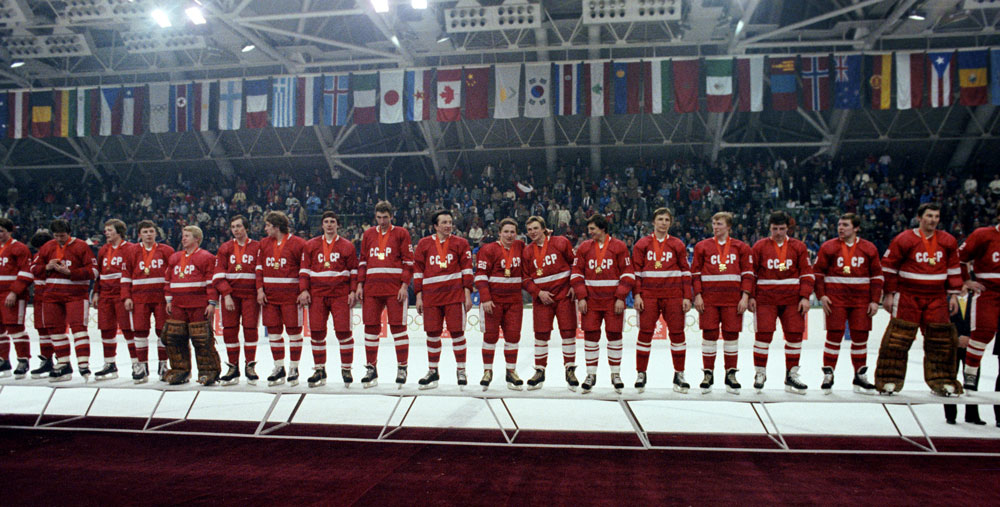
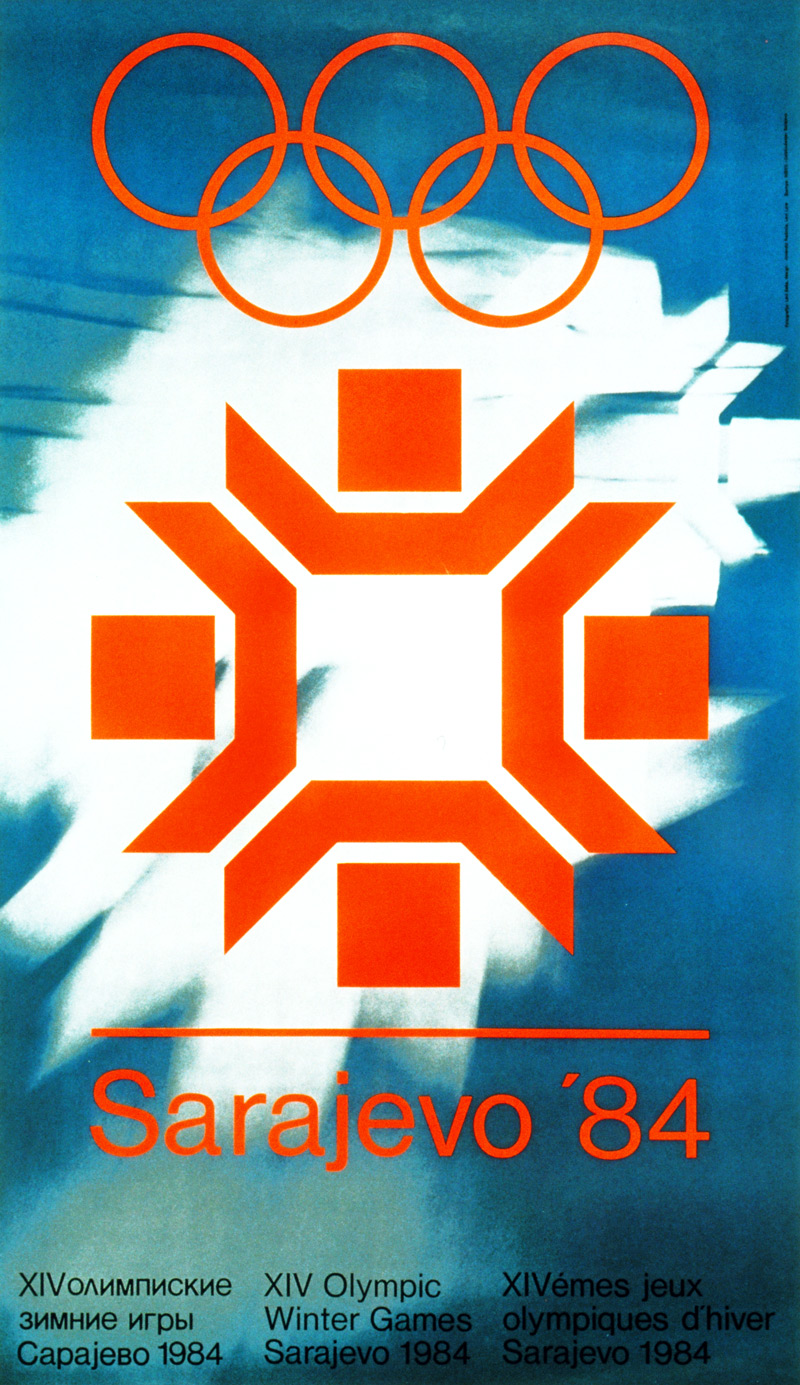
Team USSR
Team Czechoslovakia
Team Sweden
The Soviet Union iced arguably the best team in its history en route to the gold medal. The famous Central Red Army First Five of Larionov, Makarov, Krutov, Fetisov and Kasatonov was in its prime and legendary goalie Vladislav Tretiak made his final international appearance.
The result was one of the most one-side tournaments in modern times. The Soviets recorded a perfect 7-0 record, outscoring their opponents 48-5 and allowing only one goal in the medal round. Nikolai Drozdetsky, a talented winger from Leningrad, upstaged his Moscow colleagues by scoring 10 goals in seven games for the Olympic champs.

Team USSR
Team Czechoslovakia
Team Sweden
Czechoslovakia, which lost 2-0 to the Soviets on closing day, claimed the silver medal and Sweden the bronze. Dave King's Canadian team placed fourth, failing to score a single goal in three medal round games. Canada defeated the defending Olympic champions from the United States 4-2 in the first game of the tournament, and ran up four straight wins before losing to Czechoslovakia in the final game of its first-round schedule.
West Germany narrowly missed qualifying for the medal round. They were led by giant centre Erich Kuhnhackl who topped the tournament in scoring with eight goals and 14 points. Despite matching Sweden's seven points in the preliminary round, the West Germans were sidelined because the former registered a better goals differential.
| Rank | Country | Games | Wins | Losses | OT Losses | Points |
|---|---|---|---|---|---|---|
| 1 | USSR | 7 | 7 | 0 | 0 | 14 |
| 2 | Czechoslovakia | 7 | 6 | 1 | 0 | 12 |
| 3 | Sweden | 7 | 4 | 2 | 1 | 9 |
| 4 | Canada | 7 | 4 | 3 | 0 | 8 |
| 5 | West Germany | 6 | 4 | 1 | 1 | 9 |
| 6 | Finland | 6 | 2 | 3 | 1 | 5 |
| 7 | USA | 6 | 2 | 2 | 2 | 6 |
| 8 | Poland | 6 | 1 | 5 | 0 | 2 |
| N/R | Austria | 5 | 1 | 4 | 0 | 2 |
| N/R | Italy | 5 | 1 | 4 | 0 | 2 |
| N/R | Norway | 5 | 0 | 4 | 1 | 1 |
| N/R | Yugoslavia | 5 | 1 | 4 | 0 | 2 |
Chronology
| Description | Team | Score | Team | Score |
|---|---|---|---|---|
| Group A | Italy | 3 | Sweden | 11 |
| Group A | Poland | 1 | USSR | 12 |
| Group A | West Germany | 8 | Yugoslavia | 1 |
| Group A | Sweden | 11 | Yugoslavia | 0 |
| Group A | Poland | 5 | West Germany | 8 |
| Group A | USSR | 5 | Italy | 1 |
| Group A | Sweden | 1 | West Germany | 1 |
| Group A | USSR | 9 | Yugoslavia | 1 |
| Group A | Italy | 6 | Poland | 1 |
| Group A | Sweden | 10 | Poland | 1 |
| Group A | Yugoslavia | 5 | Italy | 1 |
| Group A | West Germany | 1 | USSR | 6 |
| Group A | Yugoslavia | 1 | Poland | 8 |
| Group A | West Germany | 9 | Italy | 4 |
| Group A | USSR | 10 | Sweden | 1 |
| Group B | Austria | 3 | Finland | 4 |
| Group B | USA | 2 | Canada | 4 |
| Group B | Czechoslovakia | 10 | Norway | 4 |
| Group B | Canada | 8 | Austria | 1 |
| Group B | Czechoslovakia | 4 | USA | 1 |
| Group B | Finland | 16 | Norway | 2 |
| Group B | Canada | 4 | Finland | 2 |
| Group B | Austria | 0 | Czechoslovakia | 13 |
| Group B | Norway | 3 | USA | 3 |
| Group B | USA | 7 | Austria | 3 |
| Group B | Canada | 8 | Norway | 1 |
| Group B | Finland | 2 | Czechoslovakia | 7 |
| Group B | Norway | 5 | Austria | 6 |
| Group B | Finland | 3 | USA | 3 |
| Group B | Czechoslovakia | 4 | Canada | 0 |
| Description | Team | Score | Team | Score |
|---|---|---|---|---|
| 7th-8th place | Poland | 4 | USA | 7 |
| 5th-6th place | West Germany | 7 | Finland | 4 |
| 1st to 4th place | Canada | 0 | USSR | 4 |
| 1st to 4th place | Czechoslovakia | 2 | Sweden | 0 |
| 1st to 4th place | Sweden | 2 | Canada | 0 |
| 1st to 4th place | USSR | 2 | Czechoslovakia | 0 |
Statistical Leaders
Top 15 Total Point Leaders
| Player | Country | No. | GP | G | A | P | PIM |
|---|---|---|---|---|---|---|---|
| KUHNHACKL, Erich | West Germany | 14 | 6 | 8 | 6 | 14 | 12 |
| GRADIN, Peter | Sweden | 15 | 7 | 9 | 4 | 13 | 6 |
| DROZDETSKY, Nikolai | USSR | 13 | 7 | 10 | 2 | 12 | 2 |
| RUSNAK, Darius | Czechoslovakia | - | 7 | 4 | 7 | 11 | 6 |
| FETISOV, Viacheslav | USSR | 2 | 7 | 3 | 8 | 11 | 8 |
| SKRIKO, Petri | Finland | 14 | 6 | 6 | 4 | 10 | 8 |
| HRDINA, Jiri | Czechoslovakia | 24 | 7 | 4 | 6 | 10 | 10 |
| RUZICKA, Vladimir | Czechoslovakia | 17 | 7 | 4 | 6 | 10 | 0 |
| SUMMANEN, Raimo | Finland | 25 | 6 | 4 | 6 | 10 | 4 |
| LUKAC, Vincent | Czechoslovakia | 29 | 7 | 4 | 5 | 9 | 2 |
| TYUMENEV, Viktor | USSR | 28 | 6 | 0 | 9 | 9 | 2 |
| LAFONTAINE, Pat | USA | 16 | 6 | 5 | 3 | 8 | 0 |
| KOZHEVNIKOV, Alexander | USSR | 29 | 7 | 4 | 4 | 8 | 2 |
| OHLING, Jens | Sweden | 17 | 7 | 4 | 4 | 8 | 0 |
| EKLUND, Pelle | Sweden | 14 | 7 | 2 | 6 | 8 | 0 |
Top 5 Goal Scorers
| Player | Country | No. | GP | G |
|---|---|---|---|---|
| DROZDETSKY, Nikolai | USSR | 13 | 7 | 10 |
| GRADIN, Peter | Sweden | 15 | 7 | 9 |
| KUHNHACKL, Erich | West Germany | 14 | 6 | 8 |
| SKRIKO, Petri | Finland | 14 | 6 | 6 |
| GAGNER, Dave | Canada | 19 | 7 | 5 |
Top 5 Assist Leaders
| Player | Country | No. | GP | A |
|---|---|---|---|---|
| TYUMENEV, Viktor | USSR | 28 | 6 | 9 |
| FETISOV, Viacheslav | USSR | 2 | 7 | 8 |
| RUSNAK, Darius | Czechoslovakia | - | 7 | 7 |
| EKLUND, Pelle | Sweden | 14 | 7 | 6 |
| HRDINA, Jiri | Czechoslovakia | 24 | 7 | 6 |
Top 10 Leading Goaltenders
| Player | Country | No. | GPT | GKD | GPI | MIP | MIP% | GA | SVS | SOG | SVS% | GAA | SO | W | T | L |
|---|---|---|---|---|---|---|---|---|---|---|---|---|---|---|---|---|
| TRETIAK, Vladislav | USSR | 20 | 6 | - | - | 360 | - | 4 | - | - | - | 0.67 | - | - | - | - |
| MYSHKIN, Vladimir | USSR | 1 | 1 | - | - | 60 | - | 1 | - | - | - | 1.00 | - | - | - | - |
| SINDEL, Jaromir | Czechoslovakia | 25 | 6 | - | - | 360 | - | 9 | - | - | - | 1.50 | - | - | - | - |
| RIDDERWALL, Rolf | Sweden | - | 6 | - | - | 292 | - | 9 | - | - | - | 1.85 | - | - | - | - |
| GOSSELIN, Mario | Canada | 33 | 7 | - | - | 380 | - | 14 | - | - | - | 2.22 | - | - | - | - |
| ELIOT, Darren | Canada | 1 | 2 | - | - | 40 | - | 2 | - | - | - | 3.00 | - | - | - | - |
| FRIESEN, Karl | West Germany | 27 | 5 | - | - | 300 | - | 16 | - | - | - | 3.20 | - | - | - | - |
| BEHREND, Marc | USA | 29 | 4 | - | - | 200 | - | 11 | - | - | - | 3.30 | - | - | - | - |
| VALTONEN, Jorma | Finland | - | 2 | - | - | - | - | 6 | - | - | - | 3.43 | - | - | - | - |
| MASON, Bob | USA | 1 | 3 | - | - | 160 | - | 10 | - | - | - | 3.75 | - | - | - | - |
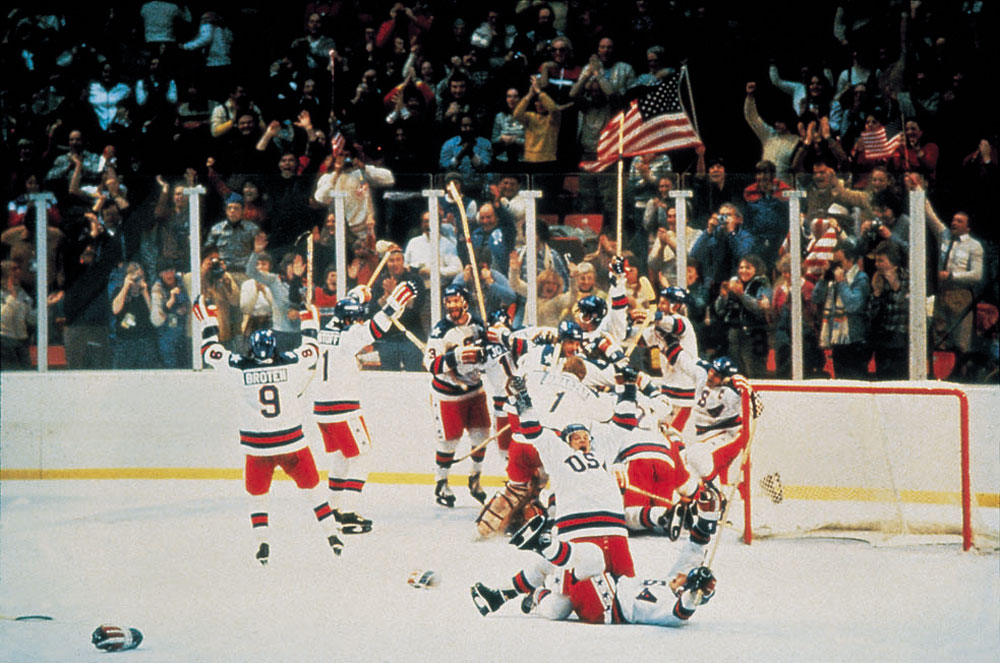
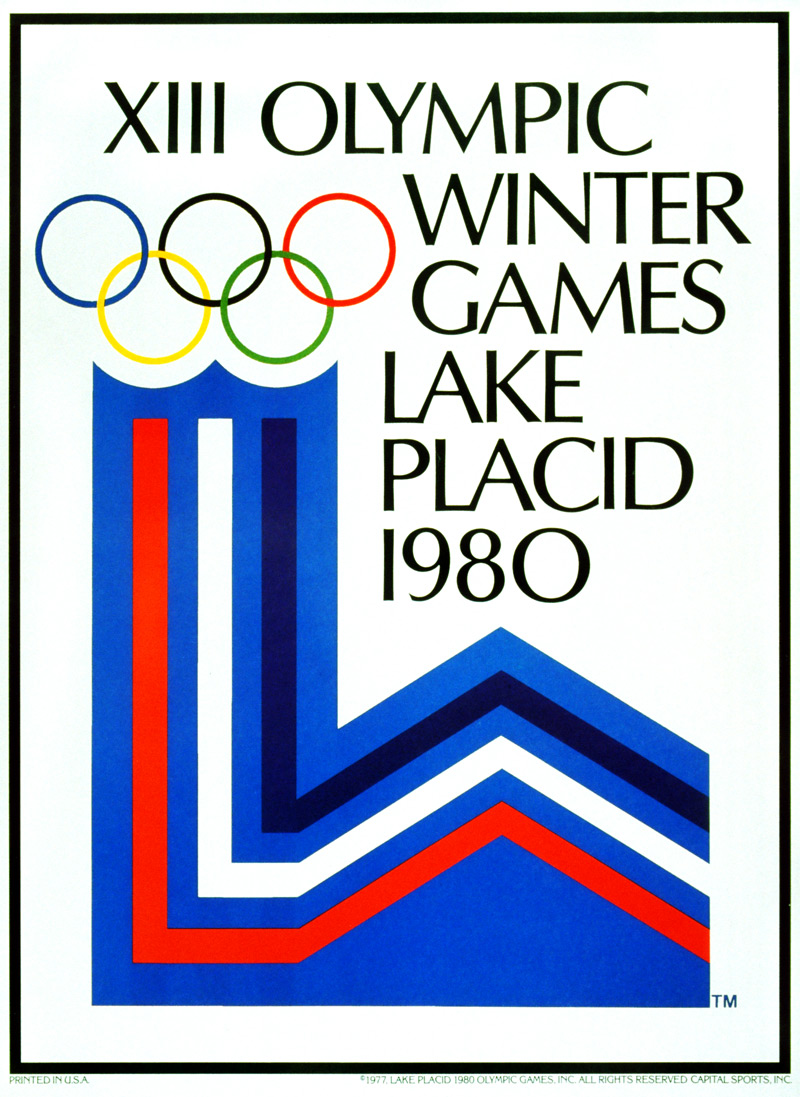
Team USA
Team USSR
Team Sweden
The United States stunned the hockey world by winning gold in what was dubbed the "Miracle on Ice." These games also witnessed Canada's first appearance since 1968. Professionals were still not allowed to compete at the Olympics which meant that Canada and the U.S. once again had to rely on amateur national teams.
The Olympics represented this year's pre-eminent tournament since no World or European Championships took place. Stocked with inexperienced collegiate players, Team USA began the Olympic tournament with a 2-2 tie against Sweden on defenseman Bill Baker's goal with 27 seconds remaining. Jim Craig starred in net, as he would throughout the tournament. The Americans then startled Czechoslovakia 7-3 and followed up with victories over Norway, Romania and West Germany.
Canada competed well in the preliminary round but losses to Finland and the USSR kept them from advancing. They finished sixth after a disheartening 6-1 loss to Czechoslovakia. The U.S.A. and Sweden finished the round robin with 4-0-1 records, but the latter earned the number one ranking as a result of a superior goal differential. Consequently the Americans faced the powerful Soviet Union in the first game of the Medal Round.

Team USA
Team USSR
Team Sweden
Mike Eruzione's third-period goal against Vladimir Myshkin proved to be the winner in a shocking 4-3 U.S. victory over their heavily-favored Soviets. With a crowd of 10,000 jammed into the Olympic Arena and millions more Americans glued to their TV sets, the USSR built up leads of 1-0 and 2-1 during the first period, but a Mark Johnson goal as time expired sent the teams to the dressing room tied 2-2. Soviet coach Victor Tikhonov then replaced legendary goaltender Vladislav Tretiak with Myshkin to start the second period. After 40 minutes, the Soviets led 3-2 and were out shooting the Americans 30-10. In the third period, Johnson tied the game before Eruzione immortalized himself with the most famous goal in U.S. hockey history.
The Americans faced Finland in the final game two days later. A loss would have meant a silver medal, but the United States earned gold with a 4-2 victory. The USSR took their frustration out on Sweden by a 9-2 score to capture the silver and leave their opponents with the bronze.
| Rank | Country | Games | Wins | Losses | OT Losses | Points |
|---|---|---|---|---|---|---|
| 1 | USA | 7 | 6 | 0 | 1 | 13 |
| 2 | USSR | 7 | 6 | 1 | 0 | 12 |
| 3 | Sweden | 7 | 4 | 1 | 2 | 10 |
| 4 | Finland | 7 | 3 | 3 | 1 | 7 |
| 5 | Czechoslovakia | 6 | 4 | 2 | 0 | 8 |
| 6 | Canada | 6 | 3 | 3 | 0 | 6 |
| 7 | Poland | 5 | 2 | 3 | 0 | 4 |
| 8 | Netherlands | 5 | 1 | 3 | 1 | 3 |
| 9 | Romania | 5 | 1 | 3 | 1 | 3 |
| 10 | West Germany | 5 | 1 | 4 | 0 | 2 |
| 11 | Norway | 5 | 0 | 4 | 1 | 1 |
| 12 | Japan | 5 | 0 | 4 | 1 | 1 |
Chronology
| Description | Team | Score | Team | Score |
|---|---|---|---|---|
| Red Division | Canada | 10 | Netherlands | 1 |
| Red Division | Finland | 4 | Poland | 5 |
| Red Division | USSR | 16 | Japan | 0 |
| Red Division | USSR | 17 | Netherlands | 4 |
| Red Division | Canada | 5 | Poland | 1 |
| Red Division | Finland | 6 | Japan | 3 |
| Red Division | Netherlands | 3 | Japan | 3 |
| Red Division | Poland | 1 | USSR | 8 |
| Red Division | Finland | 4 | Canada | 3 |
| Red Division | Japan | 0 | Canada | 6 |
| Red Division | Poland | 3 | Netherlands | 5 |
| Red Division | USSR | 4 | Finland | 2 |
| Red Division | Japan | 1 | Poland | 5 |
| Red Division | Canada | 4 | USSR | 6 |
| Red Division | Netherlands | 3 | Finland | 10 |
| Blue Division | Norway | 0 | Czechoslovakia | 11 |
| Blue Division | West Germany | 4 | Romania | 6 |
| Blue Division | USA | 2 | Sweden | 2 |
| Blue Division | Sweden | 8 | Romania | 0 |
| Blue Division | West Germany | 10 | Norway | 4 |
| Blue Division | Czechoslovakia | 3 | USA | 7 |
| Blue Division | Norway | 1 | USA | 5 |
| Blue Division | Czechoslovakia | 7 | Romania | 2 |
| Blue Division | West Germany | 2 | Sweden | 5 |
| Blue Division | Sweden | 7 | Norway | 1 |
| Blue Division | Czechoslovakia | 11 | West Germany | 3 |
| Blue Division | Romania | 2 | USA | 7 |
| Blue Division | Romania | 3 | Norway | 3 |
| Blue Division | Sweden | 4 | Czechoslovakia | 2 |
| Blue Division | USA | 4 | West Germany | 2 |
| Description | Team | Score | Team | Score |
|---|---|---|---|---|
| 5th-6th place | Canada | 1 | Czechoslovakia | 6 |
| 1st to 4th place | USSR | 3 | USA | 4 |
| 1st to 4th place | Sweden | 3 | Finland | 3 |
| 1st to 4th place | Finland | 2 | USA | 4 |
| 1st to 4th place | USSR | 9 | Sweden | 2 |
Statistical Leaders
Top 15 Total Point Leaders
| Player | Country | No. | GP | G | A | P | PIM |
|---|---|---|---|---|---|---|---|
| NOVY, Milan | Czechoslovakia | 6 | 6 | 7 | 8 | 15 | 0 |
| STASTNY, Peter | Czechoslovakia | 26 | 6 | 7 | 7 | 14 | 6 |
| POUZAR, Jaroslav | Czechoslovakia | 23 | 6 | 8 | 5 | 13 | 8 |
| GOLIKOV, Alexander | USSR | 23 | 7 | 7 | 6 | 13 | 6 |
| PORVARI, Jukka | Finland | 25 | 7 | 7 | 4 | 11 | 4 |
| KRUTOV, Vladimir | USSR | 9 | 7 | 6 | 5 | 11 | 4 |
| MIKHAILOV, Boris | USSR | 13 | 7 | 6 | 5 | 11 | 2 |
| MAKAROV, Sergei | USSR | 24 | 7 | 5 | 6 | 11 | 2 |
| JOHNSON, Mark | USA | 10 | 7 | 5 | 6 | 11 | 6 |
| STASTNY, Marian | Czechoslovakia | 18 | 6 | 5 | 6 | 11 | 4 |
| KHARLAMOV, Valeri | USSR | 17 | 7 | 3 | 8 | 11 | 2 |
| LEINONEN, Mikko | Finland | 15 | 7 | 6 | 4 | 10 | 0 |
| AHLBERG, Mats | Sweden | 12 | 7 | 6 | 4 | 10 | 13 |
| MALTSEV, Alexander | USSR | 10 | 7 | 6 | 4 | 10 | 0 |
| NASLUND, Mats | Sweden | 15 | 7 | 3 | 7 | 10 | 6 |
Top 5 Goal Scorers
| Player | Country | No. | GP | G |
|---|---|---|---|---|
| POUZAR, Jaroslav | Czechoslovakia | 23 | 6 | 8 |
| PORVARI, Jukka | Finland | 25 | 7 | 7 |
| GOLIKOV, Alexander | USSR | 23 | 7 | 7 |
| STASTNY, Peter | Czechoslovakia | 26 | 6 | 7 |
| NOVY, Milan | Czechoslovakia | 6 | 6 | 7 |
Top 5 Assist Leaders
| Player | Country | No. | GP | A |
|---|---|---|---|---|
| PERVUKHIN, Vasili | USSR | 5 | 7 | 9 |
| CHRISTIAN, Dave | USA | 23 | 7 | 8 |
| KHARLAMOV, Valeri | USSR | 17 | 7 | 8 |
| NOVY, Milan | Czechoslovakia | 6 | 6 | 8 |
| NASLUND, Mats | Sweden | 15 | 7 | 7 |
Top 10 Leading Goaltenders
| Player | Country | No. | GPT | GKD | GPI | MIP | MIP% | GA | SVS | SOG | SVS% | GAA | SO | W | T | L |
|---|---|---|---|---|---|---|---|---|---|---|---|---|---|---|---|---|
| LOFQVIST, William | Sweden | 28 | 2 | - | - | 120 | - | 1 | - | - | - | 0.50 | - | - | - | - |
| LANG, Karel | Czechoslovakia | 25 | 1 | - | - | 60 | - | 2 | - | - | - | 2.00 | - | - | - | - |
| CRAIG, Jim | USA | 30 | 7 | - | - | 420 | - | 15 | - | - | - | 2.14 | - | - | - | - |
| MYSHKIN, Vladimir | USSR | 1 | 4 | - | - | 200 | - | 8 | - | - | - | 2.40 | - | - | - | - |
| TRETIAK, Vladislav | USSR | 20 | 5 | - | - | 220 | - | 9 | - | - | - | 2.45 | - | - | - | - |
| PAGEAU, Paul | Canada | 29 | 4 | - | - | 237 | - | 11 | - | - | - | 2.79 | - | - | - | - |
| KRALIK, Jiri | Czechoslovakia | 1 | 5 | - | - | 300 | - | 15 | - | - | - | 3.00 | - | - | - | - |
| KIVELA, Antero | Finland | 1 | 3 | - | - | 180 | - | 10 | - | - | - | 3.33 | - | - | - | - |
| DUPUIS, Bob | Canada | 1 | 3 | - | - | 122 | - | 7 | - | - | - | 3.44 | - | - | - | - |
| LINDBERGH, Pelle | Sweden | 1 | 5 | - | - | 300 | - | 18 | - | - | - | 3.60 | - | - | - | - |
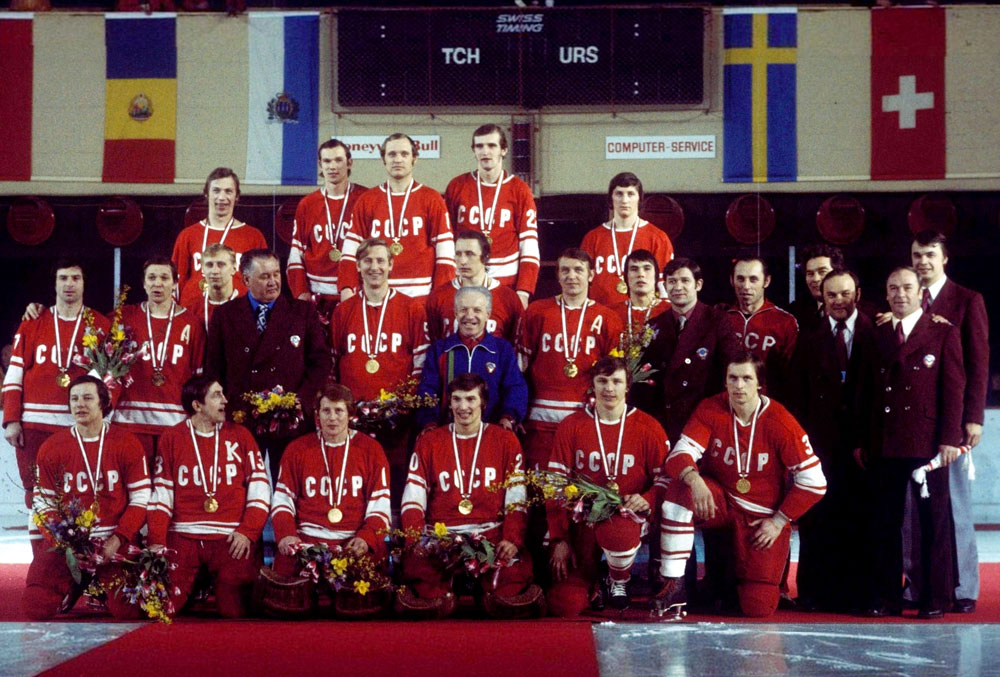
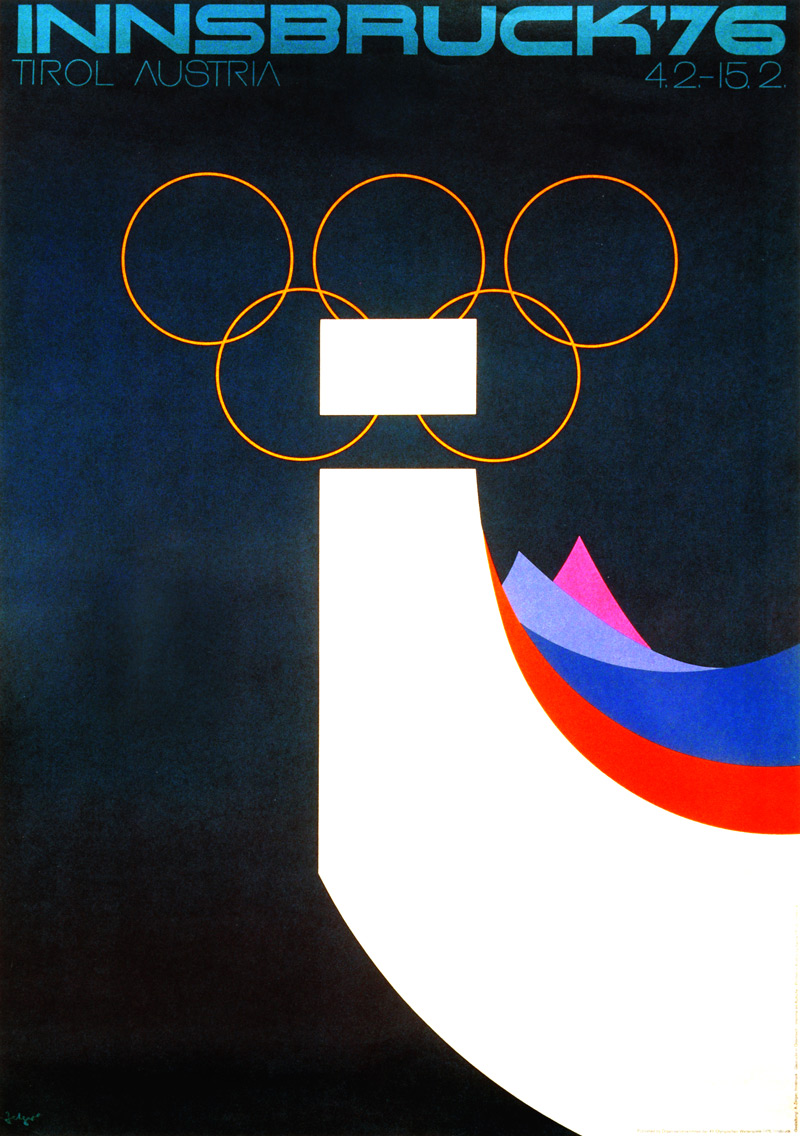
Team USSR
Team Czechoslovakia
Team West Germany
These Games were originally awarded to Denver but the protests of disgruntled U.S. taxpayers unwilling to pay for the event forced their relocation to Innsbruck. A watered-down tournament that did not include Canada or Sweden managed to produce a memorable final game.
In that contest, the Soviets trailed Czechoslovakia 2-0 midway through the second period when a pair of penalties left them two men short for two minutes. The Soviet penalty killers smothered the Czechoslovak attack, not allowing a single dangerous shot on goal during the two-man disadvantage.

Team USSR
Team Czechoslovakia
Team West Germany
The USSR eventually came from behind to tie the game 2-2 before the Czechoslovaks went ahead with nine minutes remaining in the third period. Taking advantage of a power play, the Soviets tied the game with less than five minutes to play and then scored the eventual winner 24 seconds later and grab the gold medal.
The USSR became the first country to win four consecutive Olympic tournaments. Czechoslovakia took the silver medal while the West Germans were surprise winners of the bronze. Romania was a surprise winner of the consolation group with a record of 4-1-0, outdistancing five other nations including the more experienced Austrians and Swiss.
| Rank | Country | Games | Wins | Losses | OT Losses | Points |
|---|---|---|---|---|---|---|
| 1 | USSR | 6 | 6 | 0 | 0 | 12 |
| 2 | Czechoslovakia | 6 | 4 | 2 | 0 | 8 |
| 3 | West Germany | 6 | 3 | 3 | 0 | 6 |
| 4 | Finland | 6 | 3 | 3 | 0 | 6 |
| 5 | USA | 6 | 3 | 3 | 0 | 6 |
| 6 | Poland | 6 | 2 | 4 | 0 | 4 |
| 7 | Romania | 6 | 4 | 2 | 0 | 8 |
| 8 | Austria | 6 | 3 | 3 | 0 | 6 |
| 9 | Japan | 6 | 3 | 3 | 0 | 6 |
| 10 | Yugoslavia | 6 | 3 | 3 | 0 | 6 |
| 11 | Switzerland | 6 | 2 | 4 | 0 | 4 |
| 12 | Bulgaria | 6 | 0 | 6 | 0 | 0 |
Chronology
| Description | Team | Score | Team | Score |
|---|---|---|---|---|
| Qualification Games | Romania | 4 | Poland | 7 |
| Qualification Games | Bulgaria | 1 | Czechoslovakia | 14 |
| Qualification Games | Yugoslavia | 4 | USA | 8 |
| Qualification Games | Japan | 2 | Finland | 11 |
| Qualification Games | Switzerland | 1 | West Germany | 5 |
| Qualification Games | Austria | 3 | USSR | 16 |
| 1st to 6th place | West Germany | 7 | Poland | 4 |
| 1st to 6th place | USA | 2 | USSR | 6 |
| 1st to 6th place | Finland | 1 | Czechoslovakia | 2 |
| 1st to 6th place | Poland | 1 | USSR | 16 |
| 1st to 6th place | Finland | 5 | West Germany | 3 |
| 1st to 6th place | USA | 0 | Czechoslovakia | 5 |
| 1st to 6th place | Finland | 4 | USA | 5 |
| 1st to 6th place | Czechoslovakia | 0 | Poland | 1 |
| 1st to 6th place | West Germany | 3 | USSR | 7 |
| 1st to 6th place | Poland | 2 | USA | 7 |
| 1st to 6th place | West Germany | 4 | Czechoslovakia | 7 |
| 1st to 6th place | USSR | 7 | Finland | 2 |
| 1st to 6th place | USA | 1 | West Germany | 4 |
| 1st to 6th place | Finland | 7 | Poland | 1 |
| 1st to 6th place | USSR | 4 | Czechoslovakia | 3 |
| Description | Team | Score | Team | Score |
|---|---|---|---|---|
| 7 to 12th place | Yugoslavia | 6 | Switzerland | 4 |
| 7 to 12th place | Japan | 1 | Romania | 3 |
| 7 to 12th place | Bulgaria | 2 | Austria | 6 |
| 7 to 12th place | Romania | 3 | Yugoslavia | 4 |
| 7 to 12th place | Switzerland | 8 | Bulgaria | 3 |
| 7 to 12th place | Japan | 2 | Austria | 3 |
| 7 to 12th place | Yugoslavia | 8 | Bulgaria | 5 |
| 7 to 12th place | Japan | 6 | Switzerland | 4 |
| 7 to 12th place | Austria | 3 | Romania | 4 |
| 7 to 12th place | Bulgaria | 4 | Romania | 9 |
| 7 to 12th place | Japan | 4 | Yugoslavia | 3 |
| 7 to 12th place | Austria | 3 | Switzerland | 5 |
| 7 to 12th place | Japan | 7 | Bulgaria | 5 |
| 7 to 12th place | Switzerland | 3 | Romania | 4 |
| 7 to 12th place | Yugoslavia | 1 | Austria | 3 |
Statistical Leaders
Top 15 Total Point Leaders
| Player | Country | No. | GP | G | A | P | PIM |
|---|---|---|---|---|---|---|---|
| SHADRIN, Vladimir | USSR | 19 | 6 | 10 | 4 | 14 | 4 |
| MALTSEV, Alexander | USSR | 10 | 6 | 7 | 7 | 14 | 0 |
| SHALIMOV, Viktor | USSR | 9 | 6 | 7 | 7 | 14 | 2 |
| YAKUSHEV, Alexander | USSR | 15 | 6 | 4 | 9 | 13 | 2 |
| TUREANU, Doru | Romania | 6 | 6 | 6 | 6 | 12 | 23 |
| KUHNHACKL, Erich | West Germany | 14 | 6 | 6 | 5 | 11 | 10 |
| ZHLUKTOV, Viktor | USSR | 22 | 6 | 2 | 9 | 11 | 2 |
| PETROV, Vladimir | USSR | 16 | 6 | 6 | 3 | 9 | 8 |
| ZBONTAR, Franc | Yugoslavia | 14 | 6 | 5 | 4 | 9 | 6 |
| FUNK, Lorenz | West Germany | 9 | 6 | 4 | 5 | 9 | 4 |
| KOPF, Ernst | West Germany | 11 | 6 | 4 | 5 | 9 | 2 |
| KHARLAMOV, Valeri | USSR | 17 | 6 | 3 | 6 | 9 | 6 |
| MARTINEC, Vladimir | Czechoslovakia | 10 | 5 | 5 | 3 | 8 | 2 |
| HINTERSTOCKER, Martin | West Germany | 16 | 6 | 4 | 4 | 8 | 4 |
| DOBEK, Bob | USA | 17 | 6 | 3 | 5 | 8 | 4 |
Top 5 Goal Scorers
| Player | Country | No. | GP | G |
|---|---|---|---|---|
| SHADRIN, Vladimir | USSR | 19 | 6 | 10 |
| MALTSEV, Alexander | USSR | 10 | 6 | 7 |
| SHALIMOV, Viktor | USSR | 9 | 6 | 7 |
| JENSEN, Steve | USA | 10 | 6 | 6 |
| KAPUSTIN, Sergei | USSR | 8 | 6 | 6 |
Top 5 Assist Leaders
| Player | Country | No. | GP | A |
|---|---|---|---|---|
| YAKUSHEV, Alexander | USSR | 15 | 6 | 9 |
| ZHLUKTOV, Viktor | USSR | 22 | 6 | 9 |
| MALTSEV, Alexander | USSR | 10 | 6 | 7 |
| SHALIMOV, Viktor | USSR | 9 | 6 | 7 |
| KHARLAMOV, Valeri | USSR | 17 | 6 | 6 |
Top 10 Leading Goaltenders
| Player | Country | No. | GPT | GKD | GPI | MIP | MIP% | GA | SVS | SOG | SVS% | GAA | SO | W | T | L |
|---|---|---|---|---|---|---|---|---|---|---|---|---|---|---|---|---|
| CRHA, Jiri | Czechoslovakia | 1 | 2 | - | - | 37 | - | 1 | - | - | - | 1.62 | - | - | - | - |
| SIDELNIKOV, Alexander | USSR | 1 | 2 | - | - | 120 | - | 4 | - | - | - | 2.00 | - | - | - | - |
| HOLECEK, Jiri | Czechoslovakia | - | 5 | - | - | 263 | - | 9 | - | - | - | 2.05 | - | - | - | - |
| TRETIAK, Vladislav | USSR | 20 | 4 | - | - | 240 | - | 10 | - | - | - | 2.50 | - | - | - | - |
| LEPPANEN, Antti | Finland | - | 3 | - | - | 180 | - | 9 | - | - | - | 3.00 | - | - | - | - |
| MISAWA, Minoru | Japan | 2 | 1 | - | - | 20 | - | 1 | - | - | - | 3.00 | - | - | - | - |
| MORAR, Vasile | Romania | 24 | 1 | - | - | 60 | - | 3 | - | - | - | 3.00 | - | - | - | - |
| KEHLE, Anton | West Germany | 23 | 3 | - | - | 139 | - | 8 | - | - | - | 3.45 | - | - | - | - |
| YLONEN, Urpo | Finland | 1 | 3 | - | - | - | - | 11 | - | - | - | 3.67 | - | - | - | - |
| NETEDU, Valerian | Romania | 1 | 5 | - | - | 300 | - | 19 | - | - | - | 3.80 | - | - | - | - |